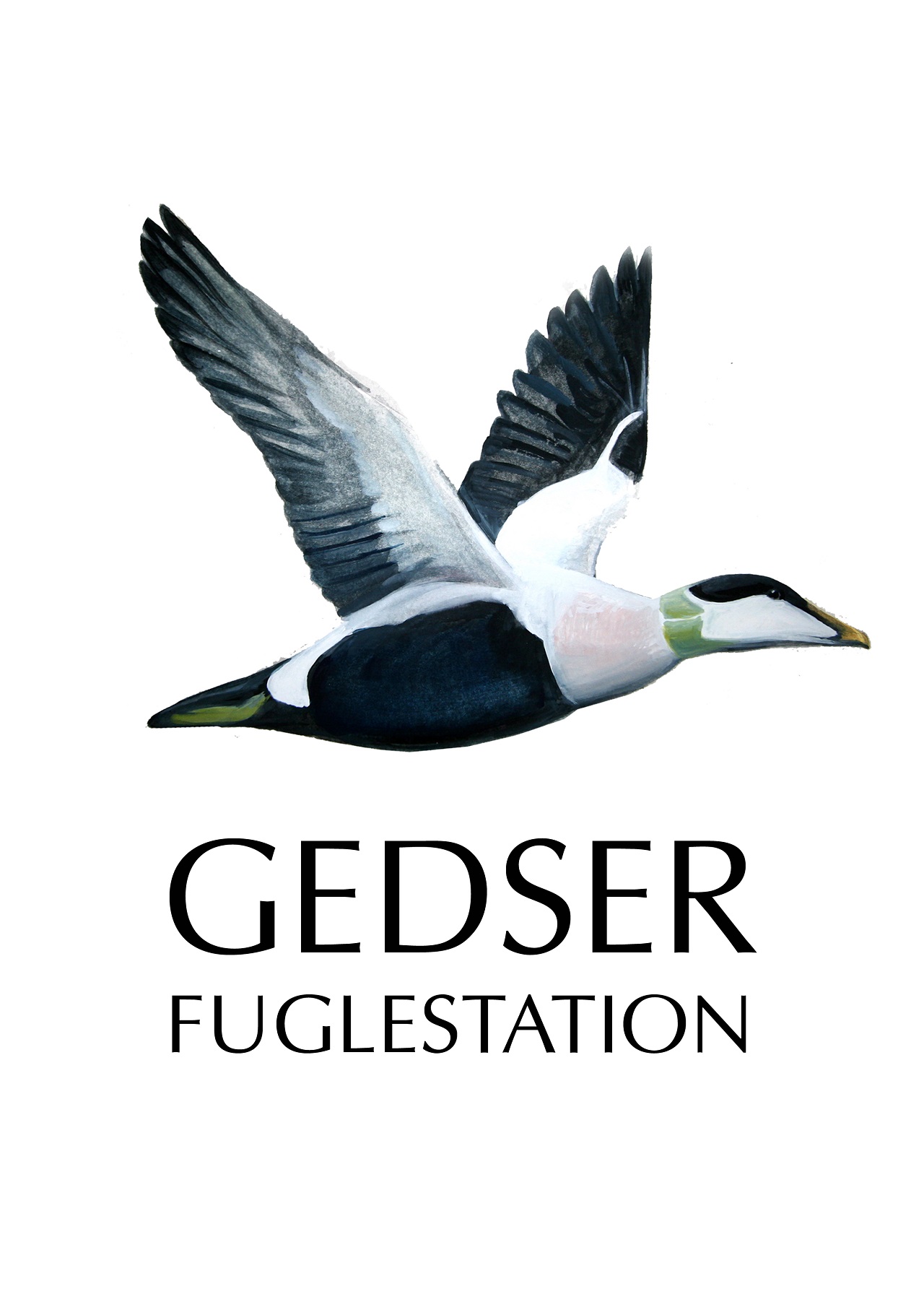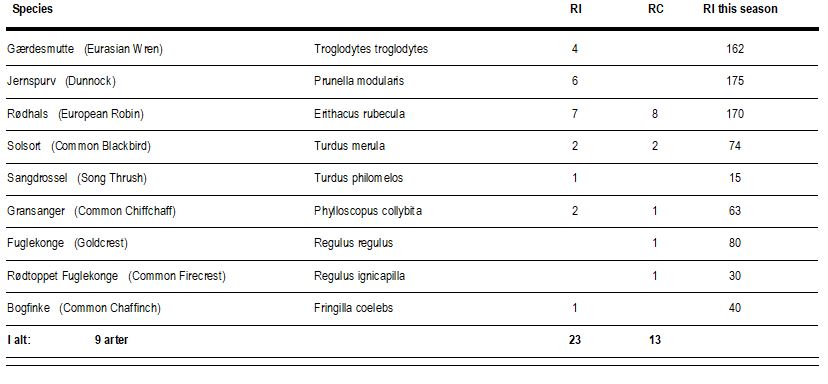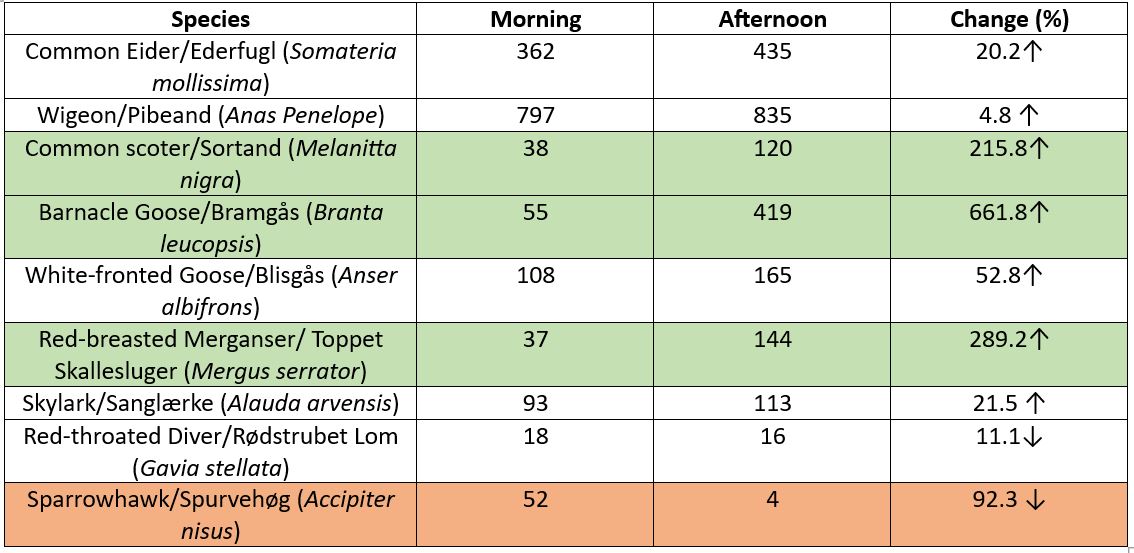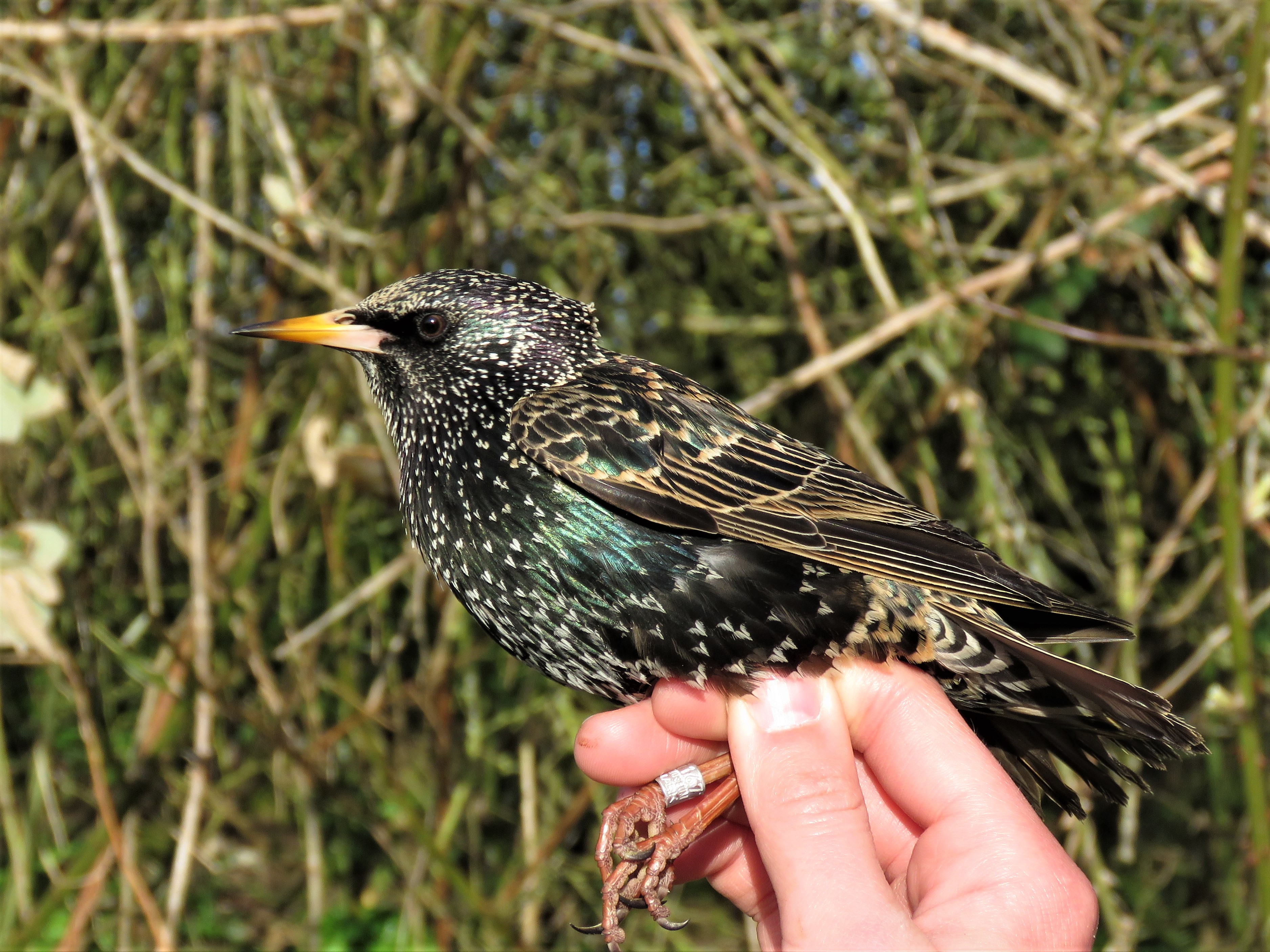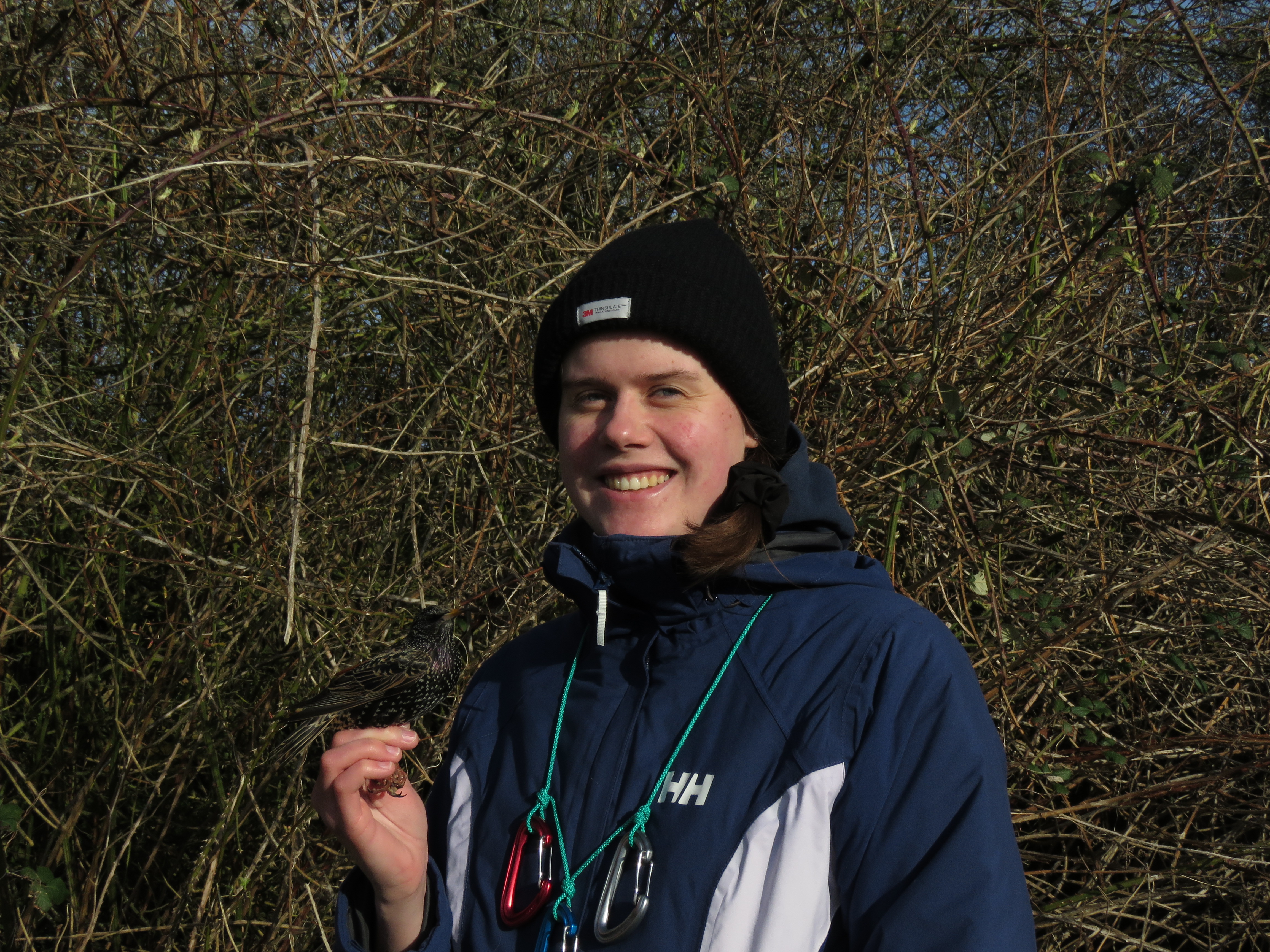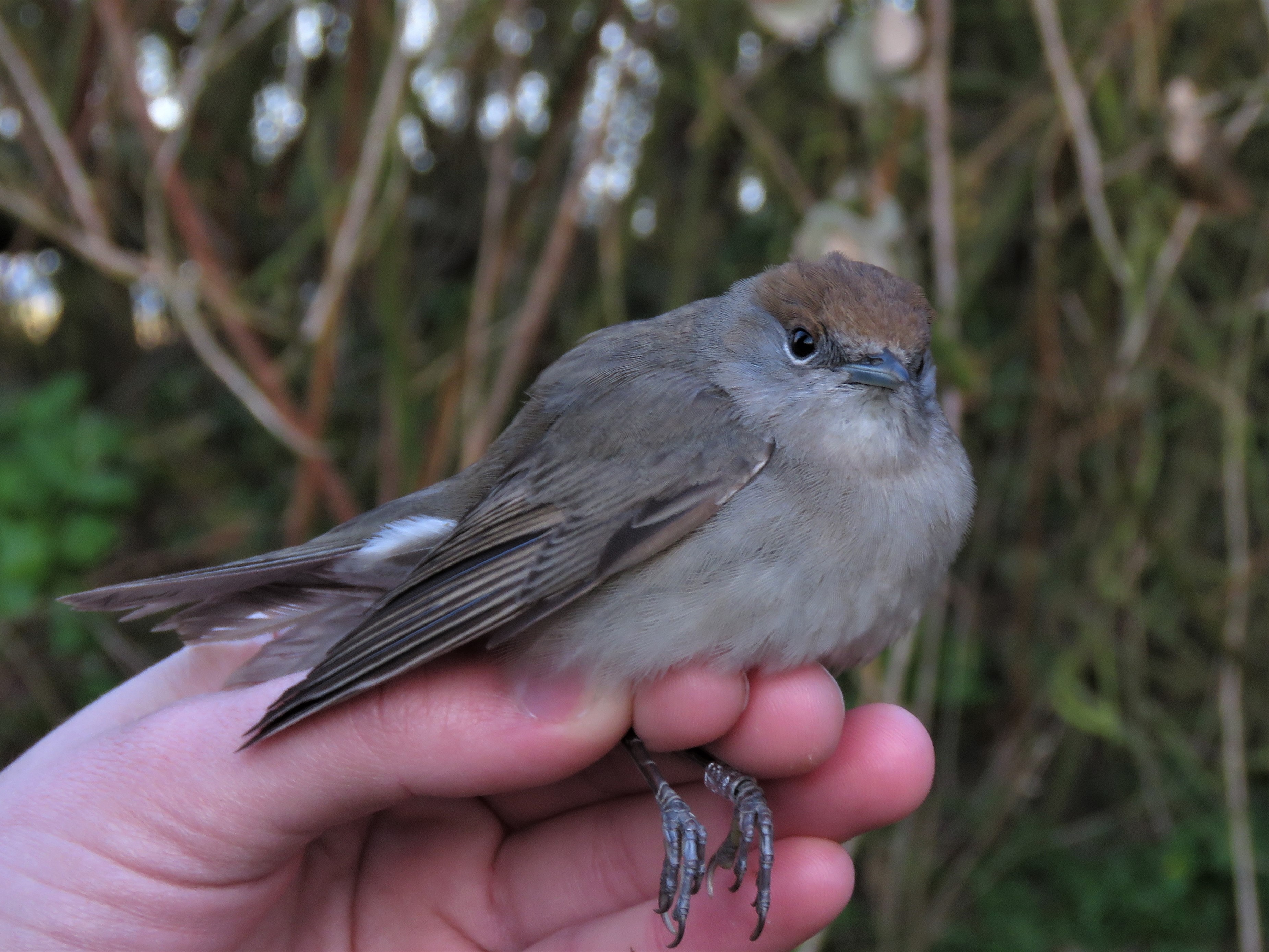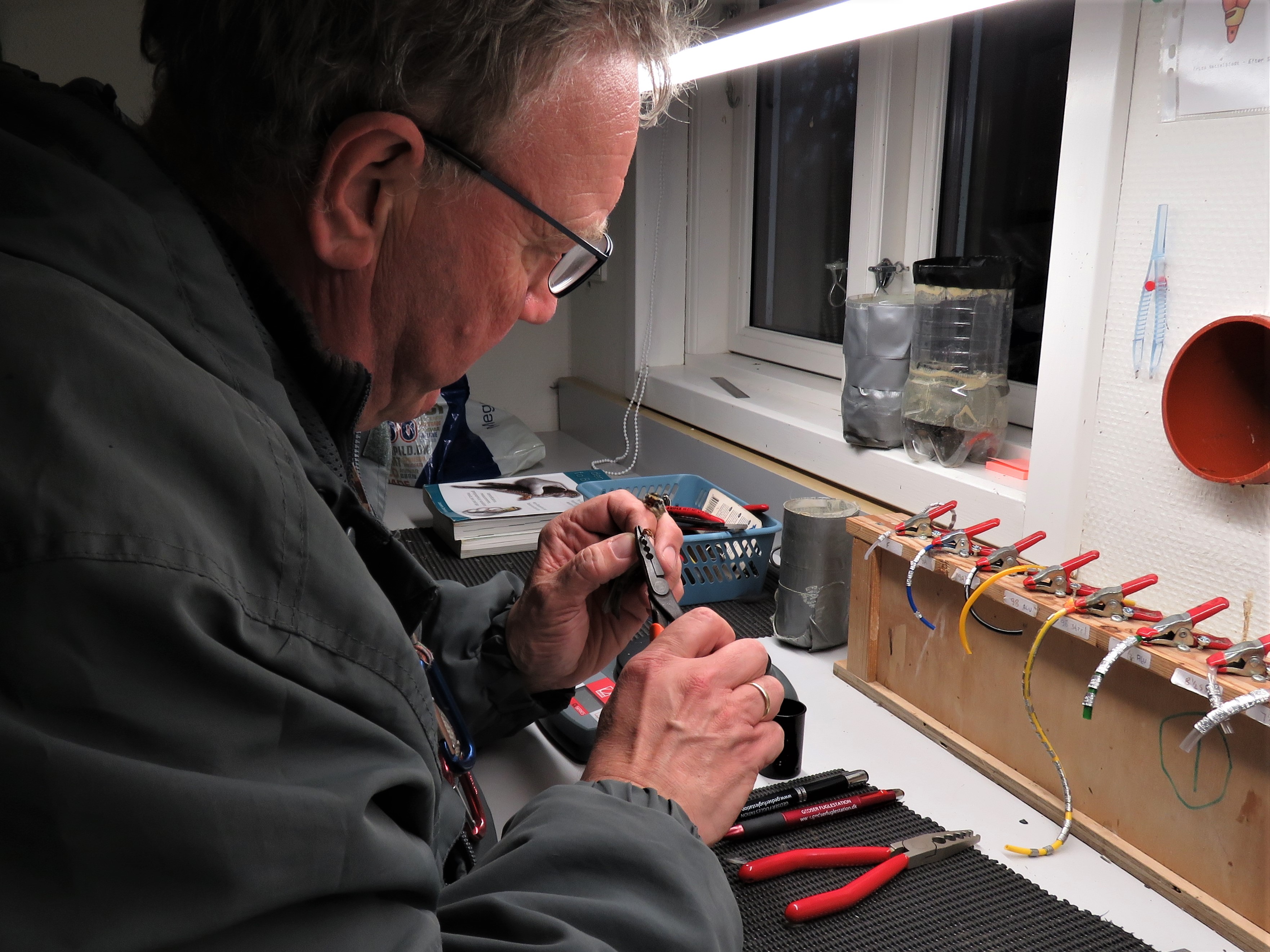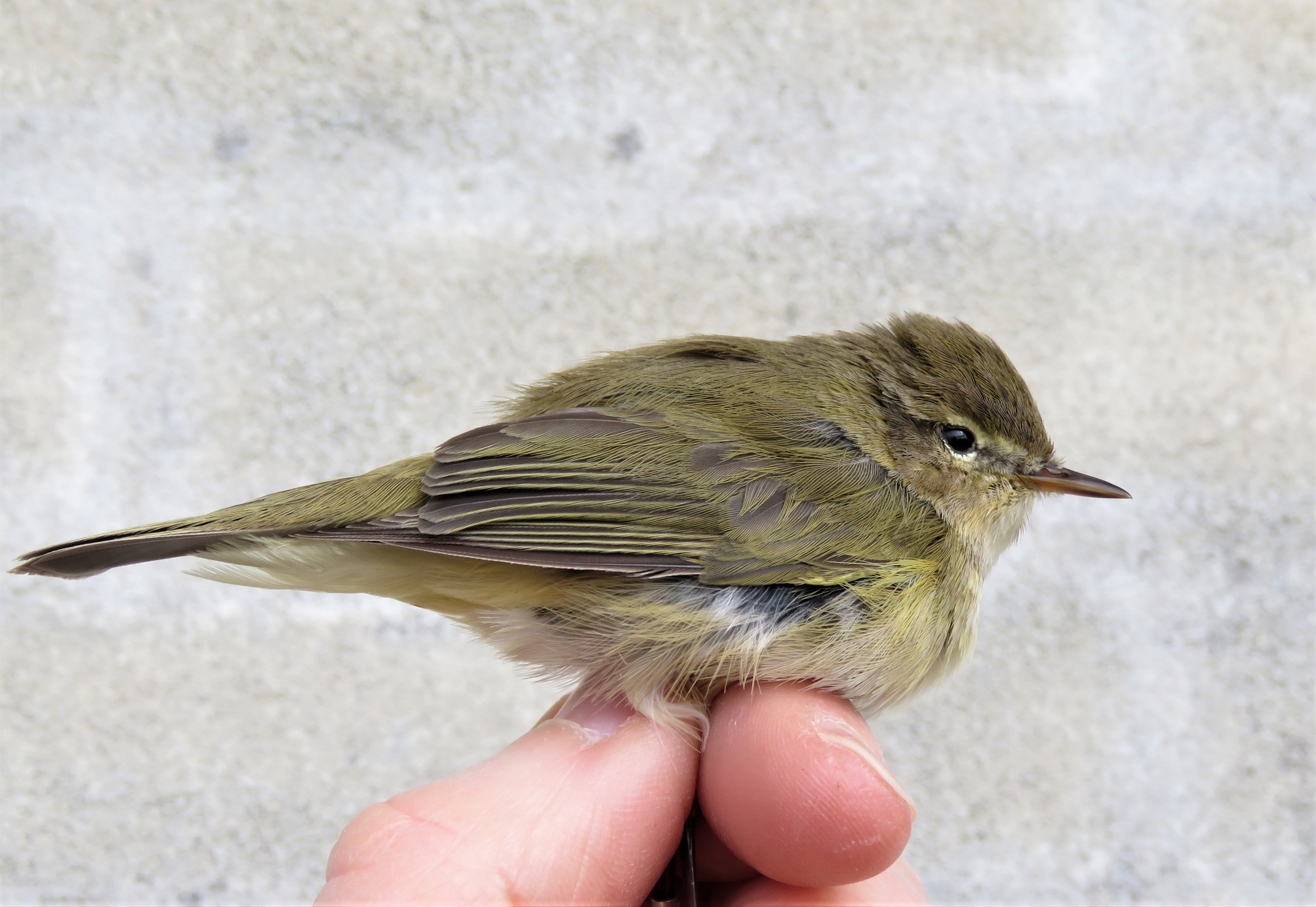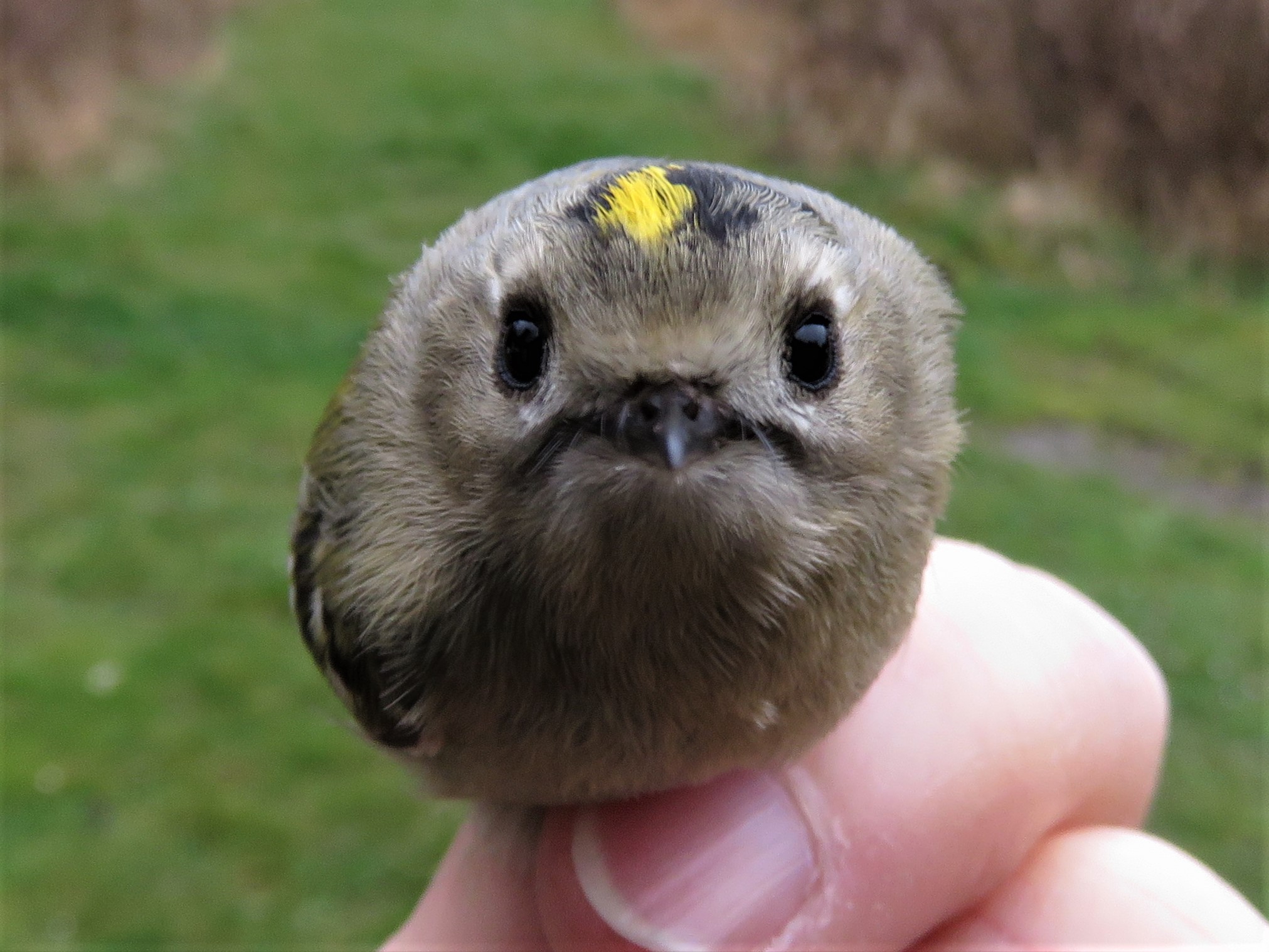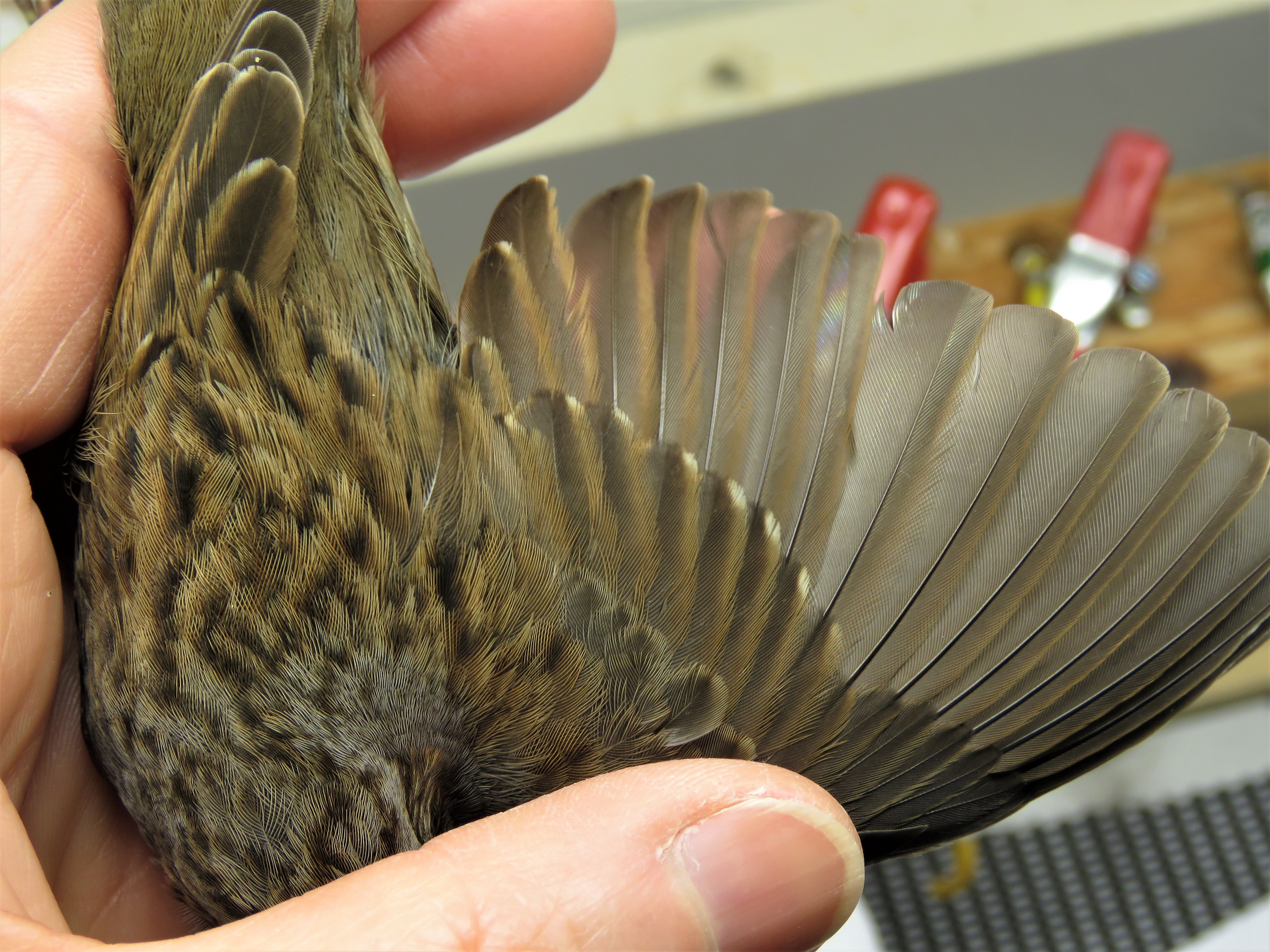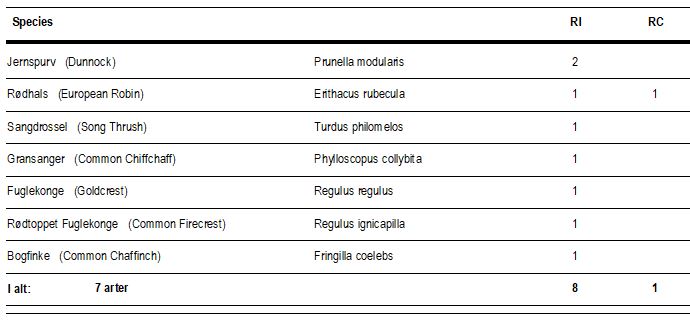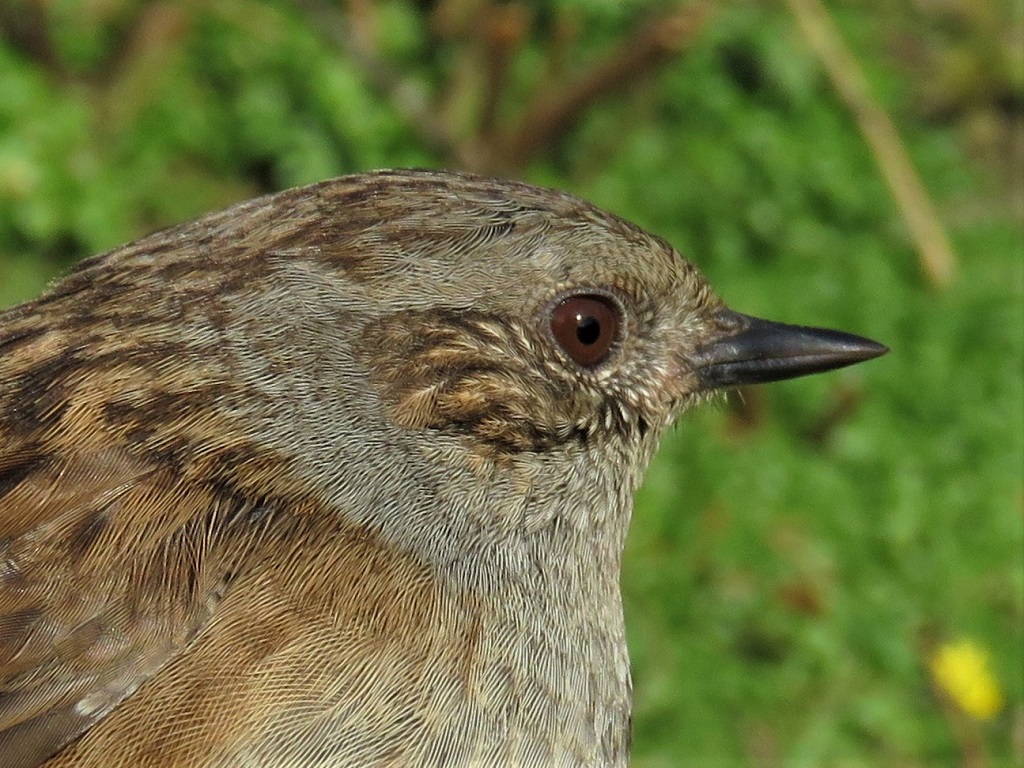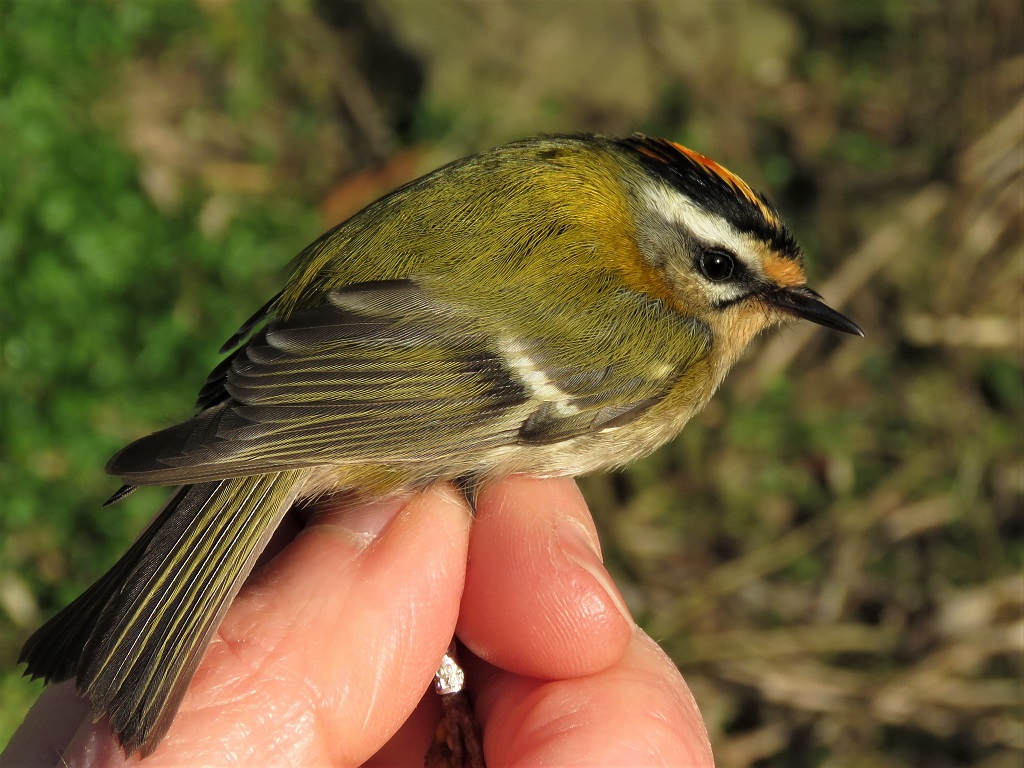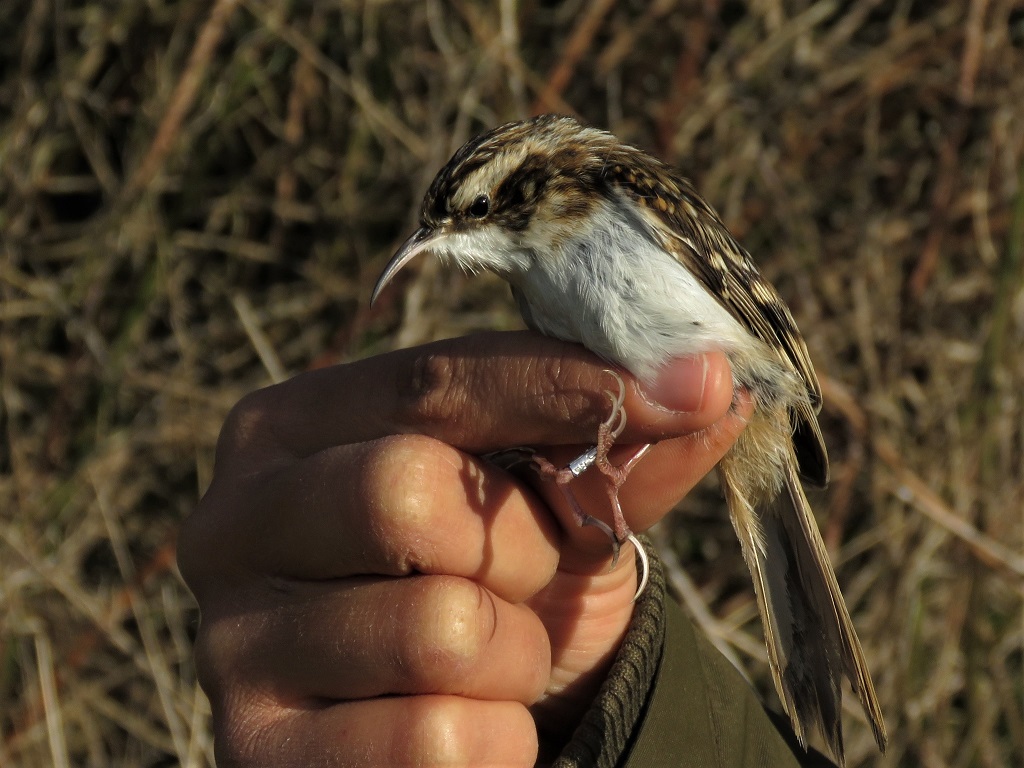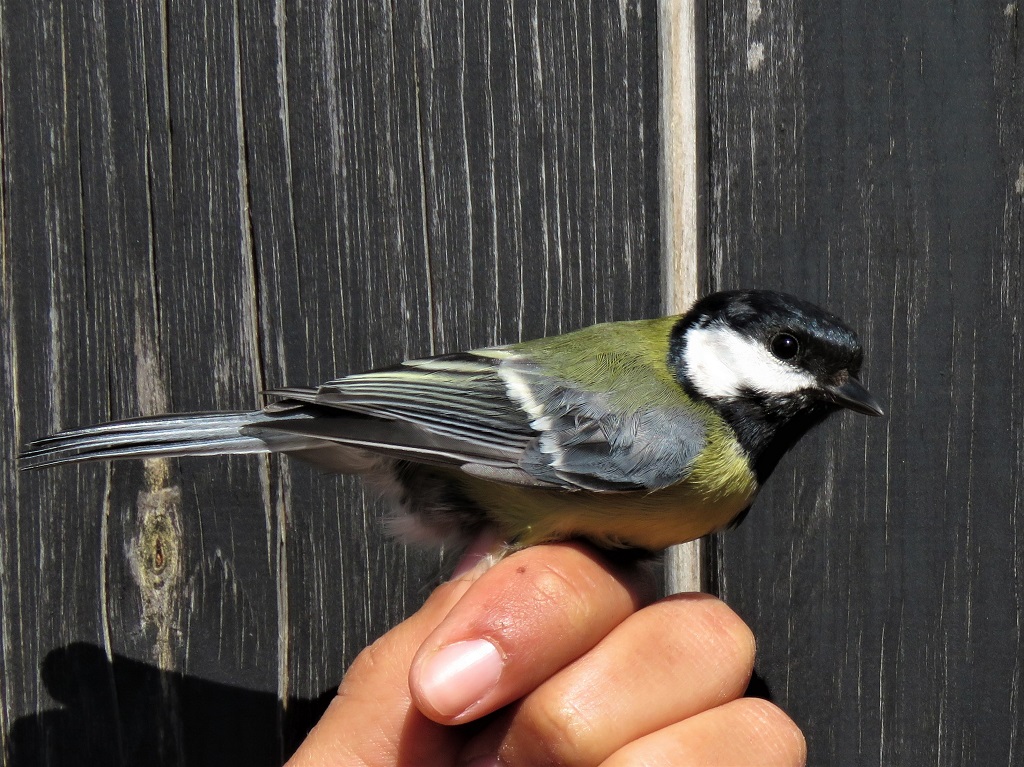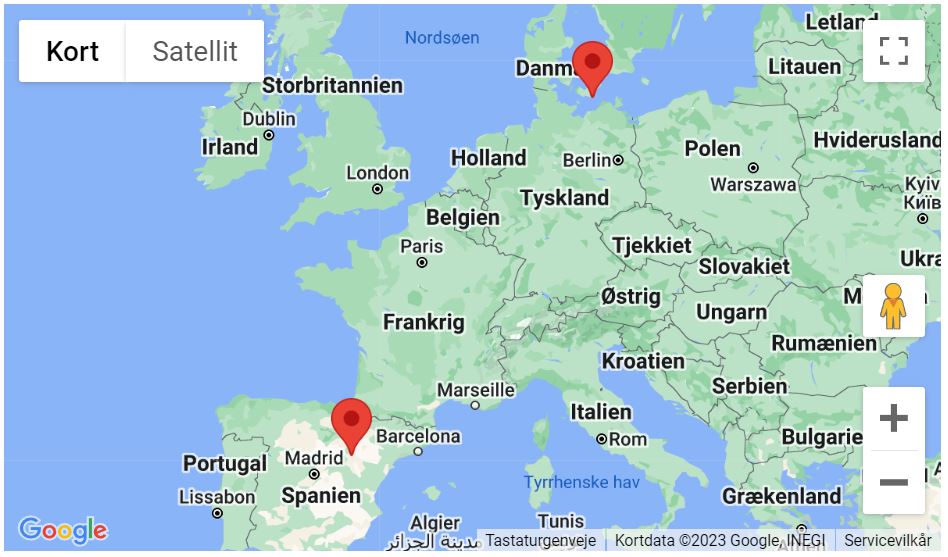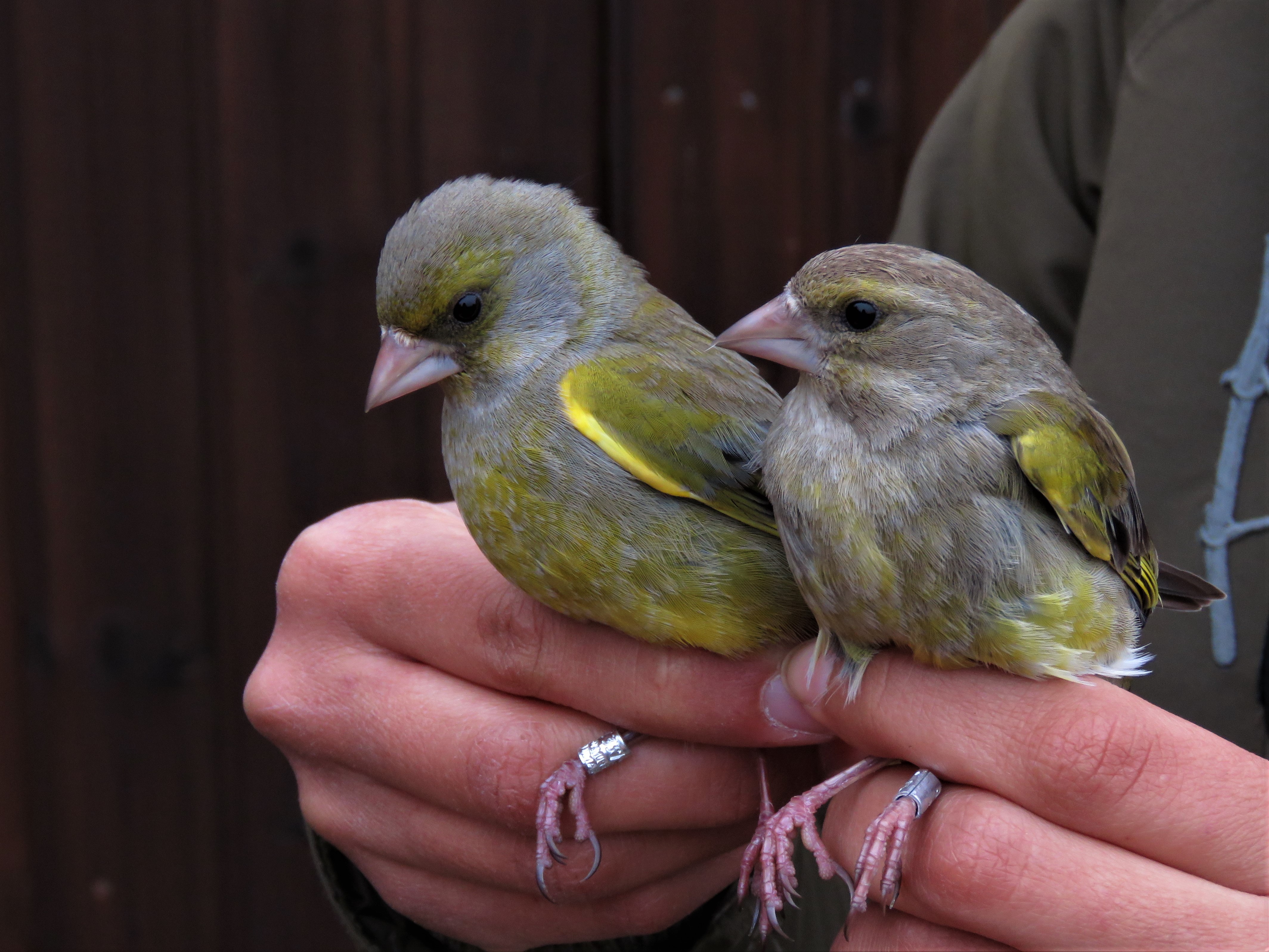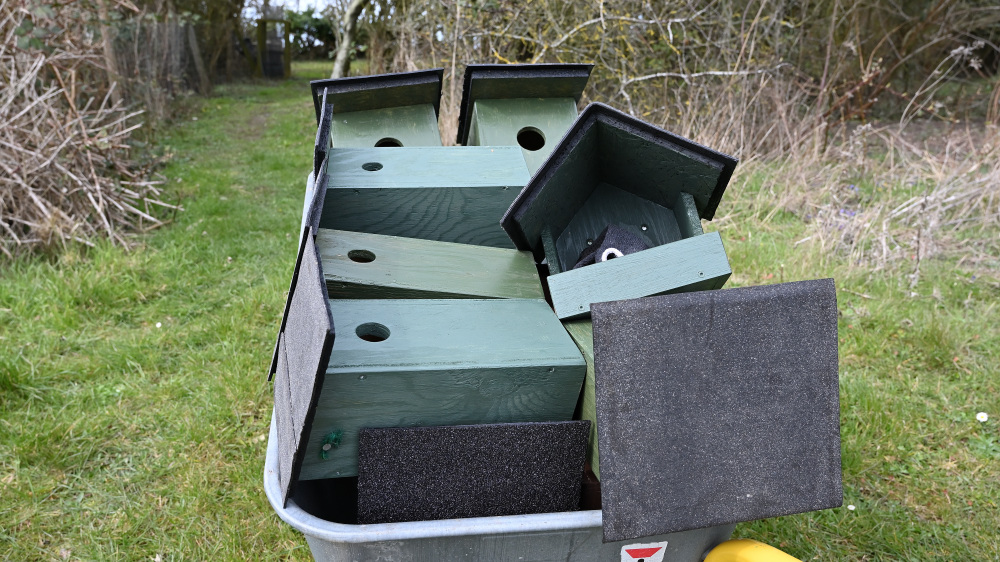Gedser Fuglestation Blog
Her på Gedser Fuglestations blog bringes korte nyheder i dagbogsformat om hændelser på fuglestationen.
Summer is almost here...
Dagen har budt på smukt vejr, men desværre ikke særlig mange fugle.
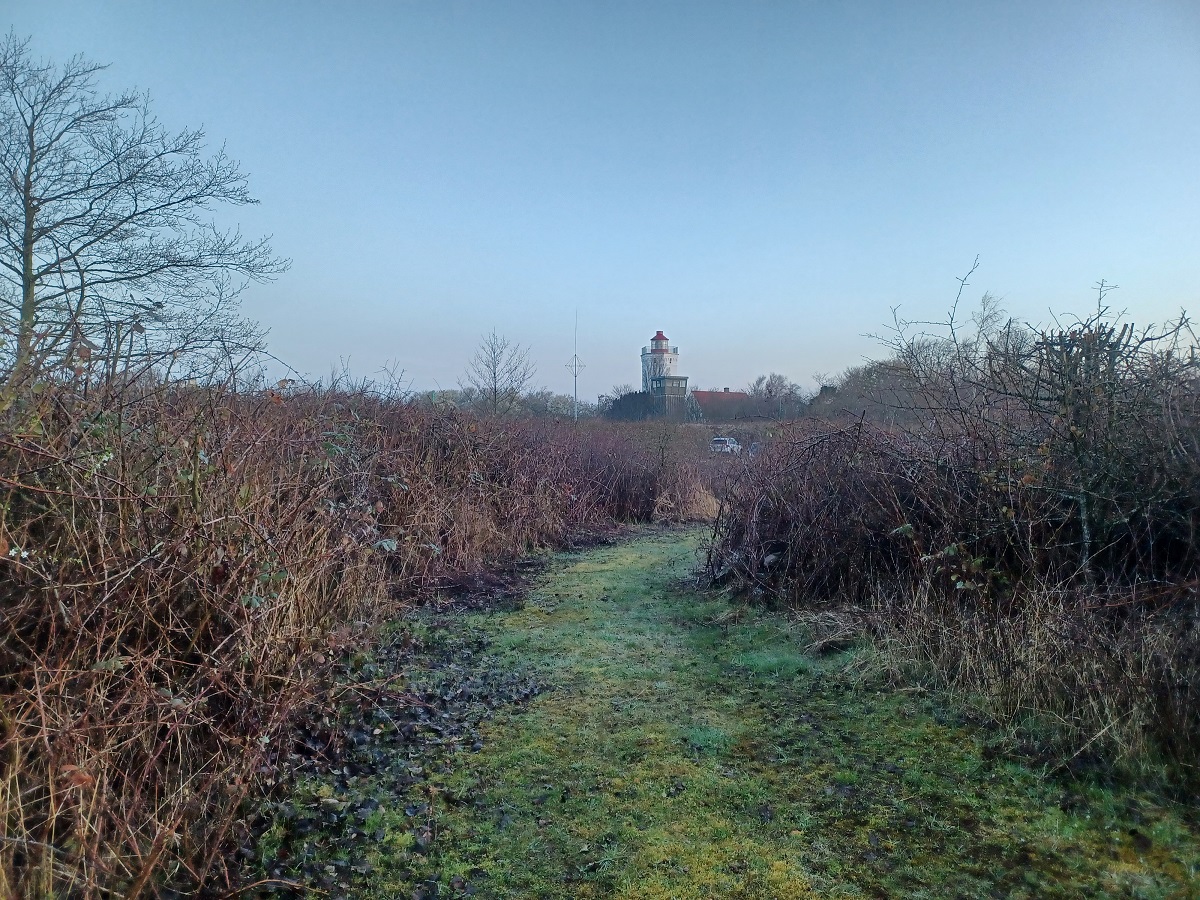
GFU's have ved solopgang. Foto: Anne R. Hermanns.
Stille dage, som denne, giver os ringmærkere mulighed for at fordybe os endnu mere i de fuglearter vi fanger, og det er gode tidspunter, hvor vi også kan dele personlige erfaringer og opservationer med hinanden.
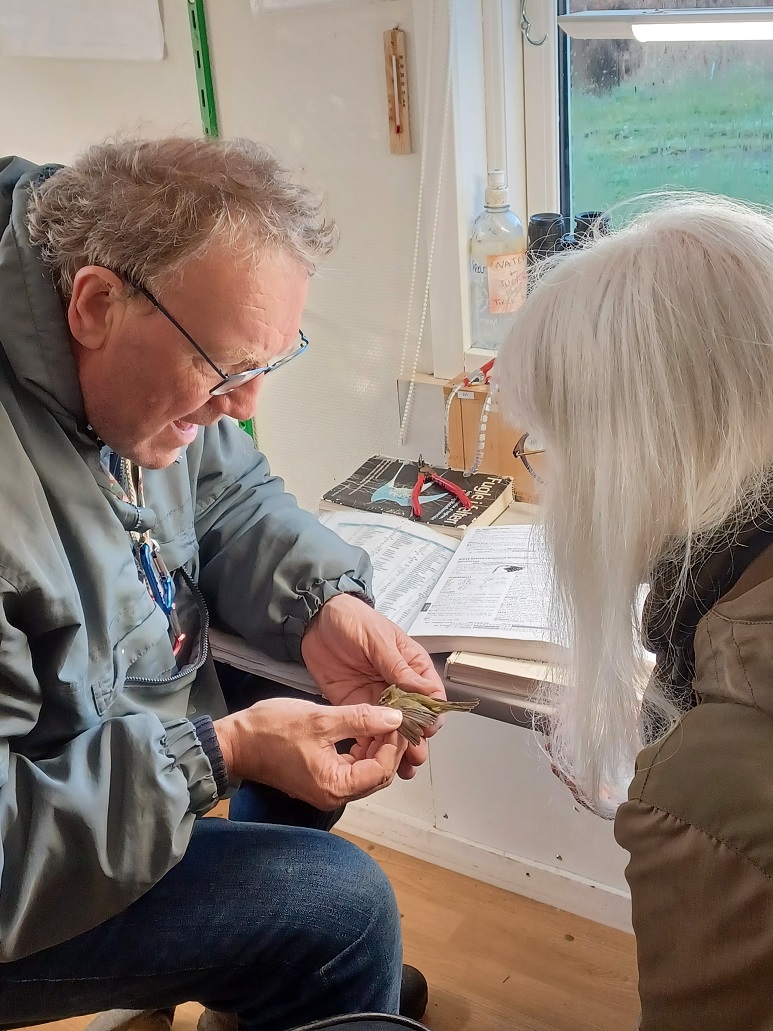
Søren, Susanne og gransanger. Foto: Anne R. Hermanns.
Fugles næb bliver løbende slidt, så derfor vokser det hele fuglens liv. Den nedestående gærdsmutte havde ikke slidt overnæbbet i samme tempo som undernæbbet og derfor havde den en form for mildt overbid. Fuglen kan sagtens klare sig med en næbdeform som denne og med tiden, får den højst sandsynligt slidt næbbet normalt igen.
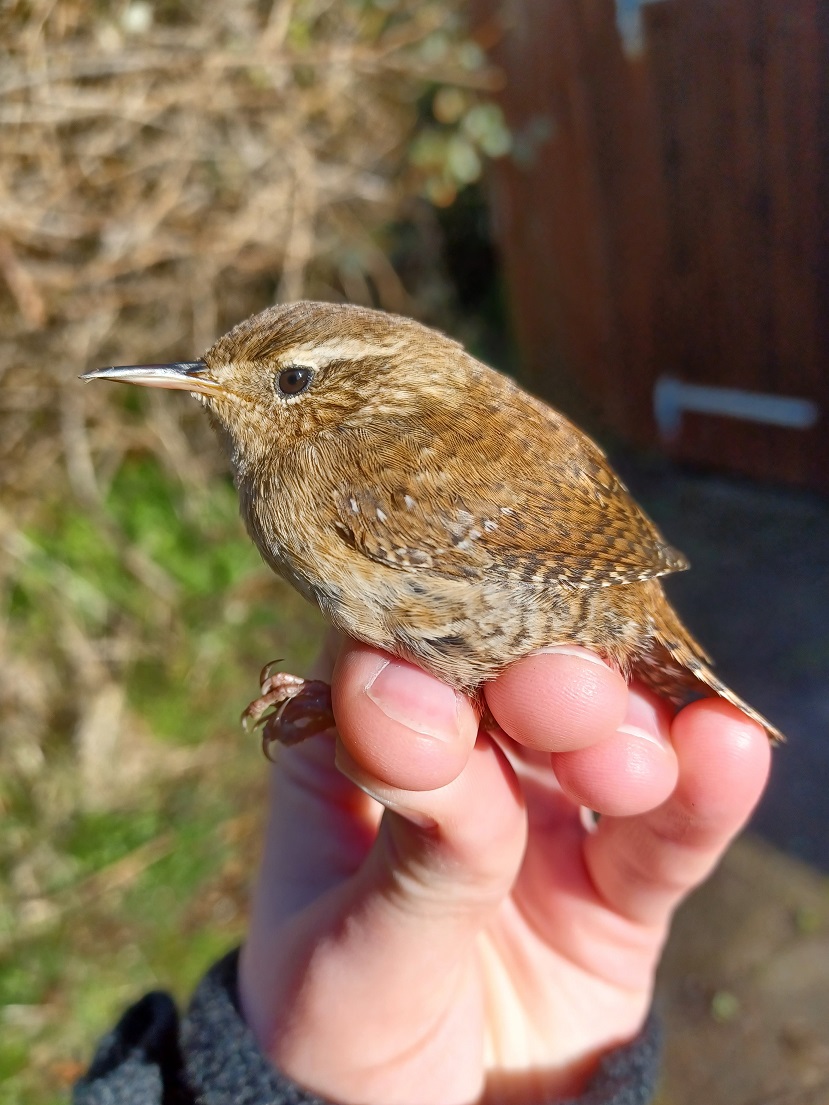
Gærdesmutte. Foto: Anne R. Hermanns.
Det gode vejr skulle selvfølgelig udnyttes, så Søren og jeg brugte noget tid efter ringmærkningen på diverse udendørs opgaver. Der er blevet sat fuglekasser på loftet, spredt flis og stablet brænde.
Folk på stationen: Anne Ramskov Hermanns, Søren Mygind og Susanne Primdahl
Flot vejr og lidt forår
Efter gårdsdagens regnvejr, som gjorde at vi desværre ikke kunne gennemføre en standardmærkning, var vejret blevet bedre i dag.
Ved åbningen af nettene til lyden af fuglesang var det således en klar, men også kølig morgen med en let sydlig vind. Da vi nu var tre på stationen og der ikke var udsigt til regn besluttede vi os for at åbne alle net undtagen det i hegnet. Allerede på den første runde var der flere fugle end i går og sådan fortsatte det gennem dagen og vi nåede i alt 48 mærkninger og 6 genfangster inden vi lukkede nettene efter standardtid, da antallet af fugle var begyndt at aftage.
De 48 fugle fordelt på 15 arter og tre mærker gjorde, at der var god tid til at fordybe sig i alders og kønsbestemmelse af de enkelte fugle, samtidigt med at der var noget at lave for alle gennem det meste af dagen.
Dagen bød ikke på nogle specielle mærkninger, til gengæld fik vi besøg af Gert. Dette affødte bl.a. en tur for Gert og Søren nu ned af "Memorie lane" til den gang hvor Rødtoppet Fuglekonge var en sjældenhed. Noget der kan være svært at forstå for unge ringmærker på en station hvor vi ind til nu har mærket 30 Rødtoppede i år. Til gengæld fik Anne en ny ringmærkningsart – Stær.
og vi fik alle Munk, eller rettere en Nonne, som ny art for året.
Efter frokost kørte Gert, Susanne og Anne op til Gerts nabo for at undersøge om der var Natugle unger i en kasse. Desværre uden held, da kassen var tom bortset fra et enkelt forladt æg.
Regn og rusk, men ringmærkere er ukuelige
Lad os sige det med samme - vejret spillede ikke på vores hold i dag.
Da vækkeuret ringede, regnede det, så vi kunne først åbne net med 3 kvarters forsinkelse. Det blev udnyttet positivt, da det gav os tid til en "luksus" morgenmad med blødkogte æg.
DMI's radar truede med mere regn længere op ad formiddagen, så vi åbnede kun knap halvdelen af nettede, så vi hurtigt kunne klappe dem sammen, når og hvis regnen kom.
Den gjorde den, så med en times pause oven i forsinkelsen fra starten af dagen blev det aldrig til en standardmærkning, og nettene blev lukket på tidspunktet for normal standardtids afslutning.
Noget af det positive ved dagen var, at Søren, som ankom i går, var med til dagens ringmærkning.
Søren startede dagen med en fugl så lille, at den knapt kunne ses i hans hånd. Det var en Rødtoppet Fuglekonge hun på bare 4,8 gram.
Foto: Susanne Primdahl
Jeg fik også ringmærket et par af de små, som skal have de allermindste ringe (F-ringe) med en diameter på kun 1,8 millimeter.
Gransangeren skal i lighed med Rødtoppet Fuglekonge have den lille F-ring.
Foto: Susanne Primdahl
Vi brugte også F-ring til denne bold, som med udslåede ben har en meget stor lighed med den almindelige Fuglekonge. ;-)
Foto: Susanne Primdahl
Vi må sige, at vi havde rigtig god tid med kun 8 ringmærkninger hele morgenen/formiddagen. Man kan vælge at mene, at det er kedeligt, men det gjorde vi ikke. Når der ikke er ret mange fugle, er der nemlig god tid til at dygtiggøre sig.
Uanset hvor mange fugle, man har ringmærket, kan man altid blive mere sikker i aldersbestemmelse, når man har lejlighed til at nærstudere og diskutere detaljer i fjerdragten med en kollega.
Her er det en Jernspurv, der bliver nærstuderet med diverse opslagsværker lige ved siden af. Det er noget helt andet at sidde med fuglen ved siden af en bog, end det er at sidde hjemme i sofaen og læse på lektien.
Foto: Susanne Primdahl
Her sidst på dagen ankom Anne, så med tre ringmærkere i gang i morgen, er vi godt rustet, hvis det vælter ind med fugle efter regnvejret i dag og den kommende nat. Vejrudsigten lover tørvejr i morgen, men vinden er godt nok stadig i syd og sydøst.
Vi krydser fingre for, at vi får noget at lave!
Dagens ringmærkninger og genfangster:
Folk på stationen:
Anne Ramskov Hermanns, Søren Mygind og Susanne Primdahl samt Hans Lind, Anne Marie Reith og Tina Elley til stationsmøde.
Skiftedag
En dag, som lignede meget den i går, hvilket betød, at vi ikke havde så mange fugle, men det allerskønneste vejr for os at være ude i.
Rødhalsene kom til at fylde lidt mere i billedet på bekostning af Jernspurvene, når vi sammenligner med tallene fra i går, men det totale antal var næsten på niveau.
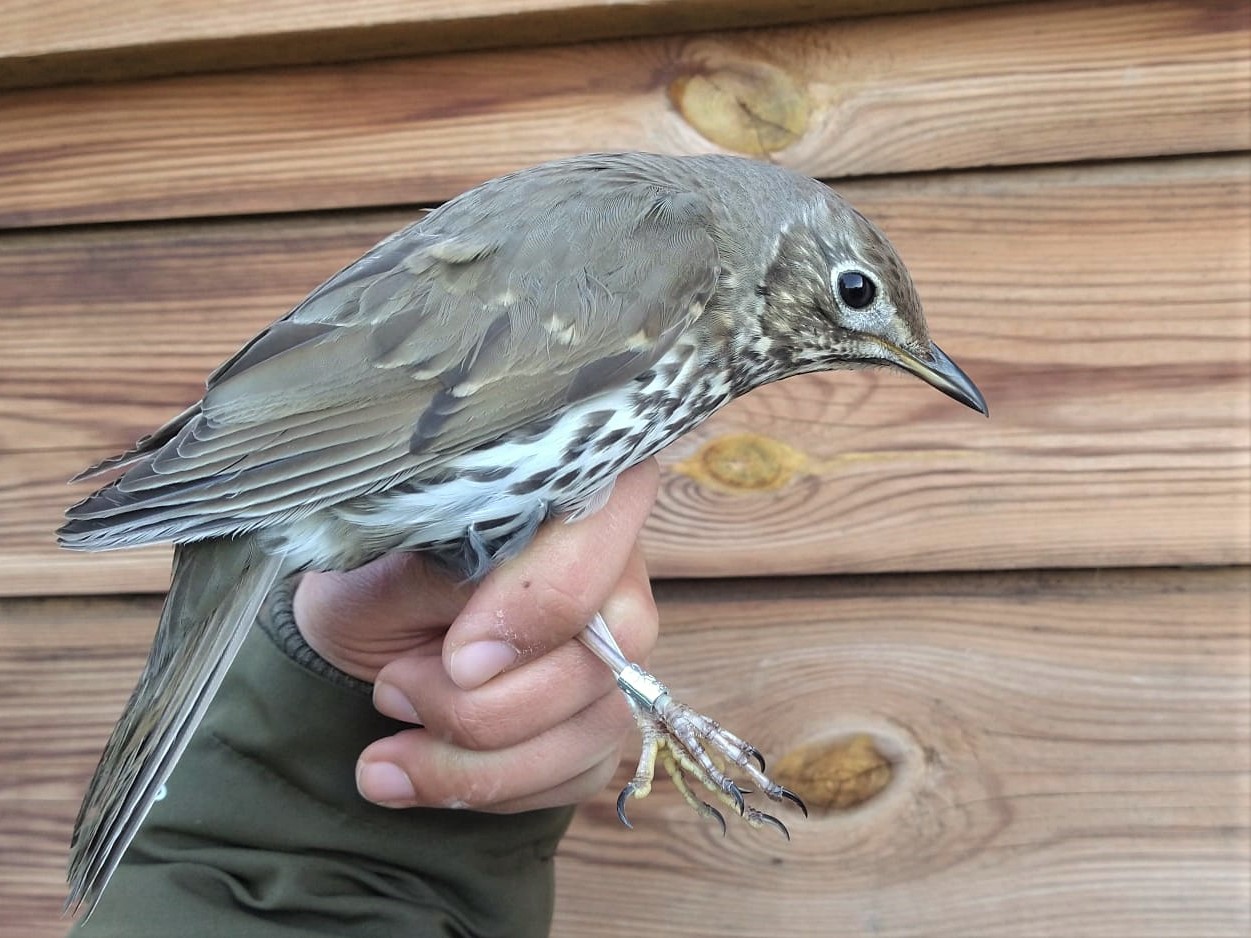
En Sangdrossel blev ringmærket. Foto: Hanelie Sidhu
Hanelie fik besøg af vores to faste rødtoppede venner, nr. 230 og 260.
Jeg kunne sætte ring på en ny Rødtoppet Fuglekonge. Den viser allerede lidt af de samme tendenser med at blive hængende i fuglestationens hyggelige omgivelser, for jeg nåede at hjælpe den ud af nettene yderligere to gange, før vi afsluttede standardmærkningen.
Vi har haft besøg af både Gert, Hans og Bo i dag, som kunne nyde solen sammen med os og spise frokosten udendørs. Derudover fik Hanelie tid til at gøre en vejledning til indtastning i databaseprogrammet færdig, og jeg gik i lag med fugleposerne, som trængte til at blive vasket.
Efter at have arbejdet på fuglestationen siden den 6. marts, er Hanelie taget herfra i dag, og Søren er ankommet for at ringmærke de næste fem dage. Vi håber, vinden snart slipper det østlige hjørne, så vi kan få lidt mere at lave.
Dagens ringmærkninger og genfangster:
Folk på stationen:
Hanelie Sidhu, Søren Mygind og Susanne Primdahl
Hvorfor bruge 5 timer, når det kan gøres på en halv?
Vi havde ikke de store forventninger til dagens ringmærkning, for vinden var stadig i det forkerte hjørne (nordøst) og ikke særlig kraftig med 4-6 m/s. At solen så også skinnede fra en næsten skyfrit himmel hele dagen, gjorde hurtigt mange net synlige for fuglene.
Selvom vi mennesker tror, vi kan regne alting ud, må vi gang på gang erkende, at det ikke altid er tilfældet, når vi har med dyr at gøre. I hvert fald havde vi efter første runde allerede ringmærket flere fugle, end vi havde hele dagen i går.
Dagens talrigeste art var Jernspurvene, som tog adskillige ture i nettene trods vores forudsigelser om, at nettene ville være synlige i solen. Da dagen var omme, havde vi brugt næsten to tredjedele af vores ringe på Jernspurve.
Nærbillede af en af dagens Jernspurve.
Foto: Susanne Primdahl
På anden runde kom Hanelies rødtoppede ven nr. 230 forbi for at sige godmorgen til hende. Jeg må tilstå, at jeg var en smule misundelig, så det hjalp, da jeg et par timer senere fik besøg af nr. 260.
Det er virkelig pudsigt, så længe de Rødtoppede Fuglekonger bliver i haven, og trods det formår de stadig ikke at smutte udenom nettene. De klarer det jo fint, men de burde bruge tiden på at æde sig tykke og fede til den videre rejse. Det beroligede os derfor, da Hanelie kunne konstatere, at nr. 230 havde fået mere på sidebenene, selvom den har været rigtig mange gange i nettene.
Er han ikke bare en flot fyr, ham nr. 260?
Foto: Susanne Primdahl
Hanelie har haft de lidt sjovere fugle i dag, og det er så velfortjent, at hun lige får en pæn slutspurt, før hun takker af i morgen.
Da Hanelie pillede denne Træløber ud af nettet, så næbbet temmelig langt ud, som var den Korttået Træløber, men med fuglen ude af nettet, så den ud som en almindelig Træløber.
Efterfølgende i labbet blev den målt og tjekket i alle ender og kanter, så ingen, der læser hendes kommentarer senere, kan være i tvivl om, at den er korrekt artsbestemt.
Foto: Susanne Primdahl
Da vi lukkede nettene kl. 11.30, foreslog Hanelie, at vi måske kunne holde nogle få net åbne med lyd ved et par stykker. Efter 2 timer havde det kun givet en Blåmejse og en Musvit, så de sidste net blev lukket.
Nu siger man jo, at kvalitet er vigtigere end kvantitet, og her var kvaliteten god. Musvitten viste sig nemlig at have en ring på fra Vogelwarte Helgoland.
Da det var Hanelie, der aflæste ringen, har hun nu sendt data til Ringmærkningsadministrationen på Statens Naturhistoriske Museum og kan se frem til en tilbagemelding med fuglens præcise ringmærkningstidspunkt og -sted.
Her er Musvitten fra Helgoland, som var en 3K+ hun. Det er lidt sjovt, at Hanelie, som er tysker, lige skulle fange en fugl fra Tyskland.
Foto: Susanne Primdahl
Dagens arbejde endte med 36 ringmærkninger (RI) og 13 aflæsninger (RC).
Jeg beklager, at listen ser lidt anderledes ud i dag, men det skyldes, at to forskellige ringmærkningsperioder med forskelligt antal netmeter er lagt sammen, og så kan programmet ikke lave den pænere oversigt, I normalt får præsenteret.
First ringed Husrødstjert for the season
A weather change or wind from another direction would be needed, to get some more birds. At the moment, the numbers are just going down from day to day. So Susanne and I just had ten ringed birds today. Two Greenfinches “Grønirisk”, a male and a female, were very nice.
Greenfinches "Grønirisk", male and female.
And although it was a slow ringing day, there was a new species for the season in Gedser today: Hans ringed the first Black Redstart “Husrødstjert” in his garden!
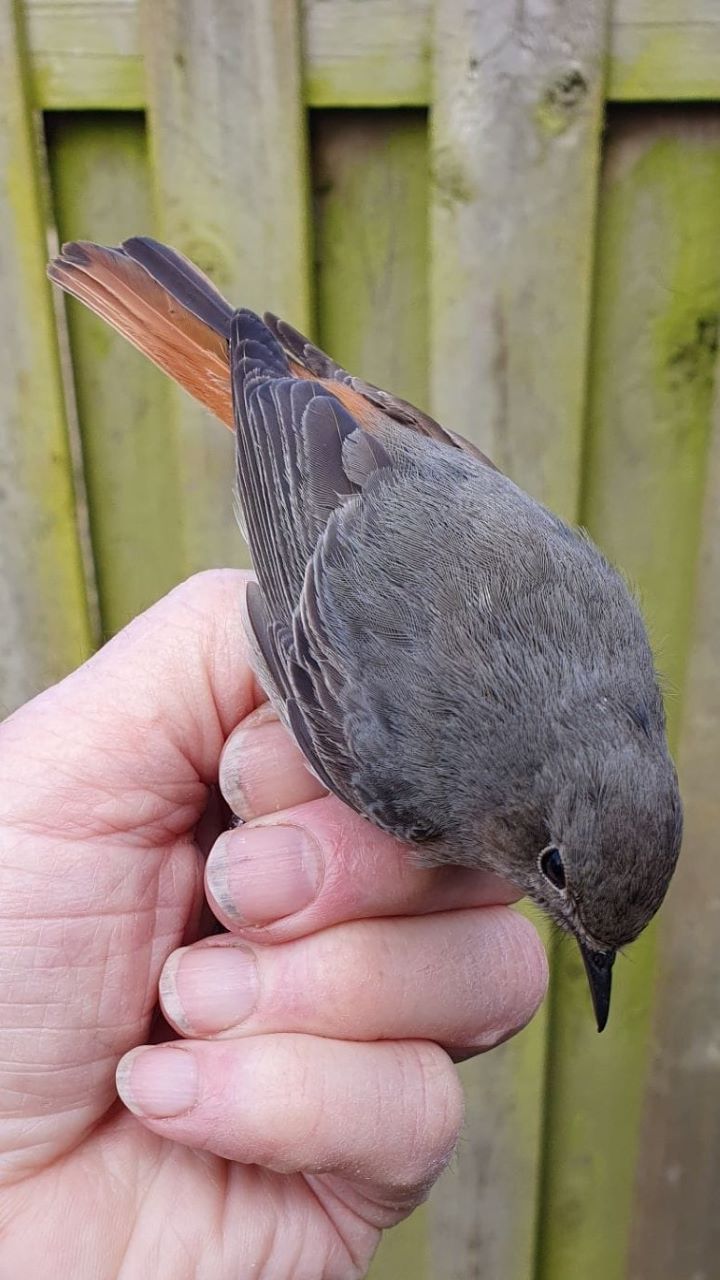
Black Redstart "Husrødstjert"
John left the Bird Observatory this afternoon, as we did not meet to say bye, I will do it here in the blog.
Tomorrow the wind will still be from east – what are we expecting… But another black Redstart “Husrødstjert” in the nets could be possible for us, no?
People: Hanelie Sidhu, Susanne Primdahl, Gert Jeppesen, Hans Lind and our Guests John and Kim
The best breakfast EVER!
This morning was rather slow again, we were worrying to have more recaptures than newly ringed birds, but luckily, we still had a few more newly ringed birds, although the numbers are very close… But that was not too bad, because like that, we had time for the best breakfast EVER! Henrik had bought some chocolate ice cream and the plan was, to eat it outside in the sun. But there was no time left for that, because Henrik went back to Copenhagen today after ringing. As we needed to make sure, that no one else ate our ice cream, the only way was to have it for breakfast between the rounds. Which we did. Delicious!

Apart from our great breakfast, the morning also brought some nice birds: We had a new Goldfinch “Stillits”, four Greenfinches “Grønirisk”, and a nice 3k+ male Linnet “Tornirisk”.
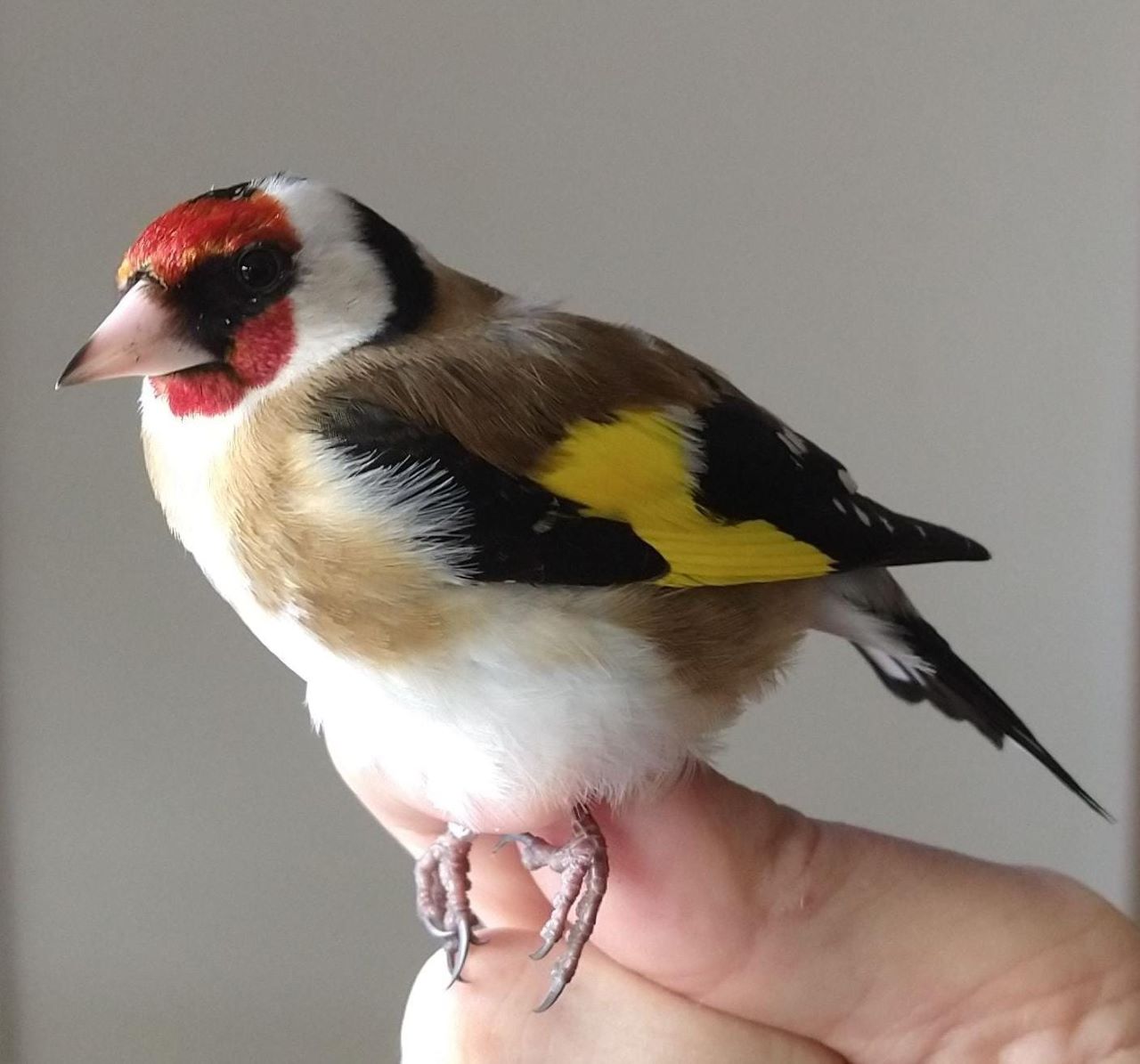
Ringing totals
Gærdesmutte 3/2
Jernspurv 2/2
Rødhals 3/4
Solsort 2/0
Gransanger2/0
Fuglekonge 2/2
Rødtoppet Fuglekonge 1/2
Bogfinke 0/1
Grønirisk 4/0
Stillits 1/0
Tornirisk 0/1
Gulspurv 0/1
Total 20/15
After ringing, Henrik left, but he will be back later in the season. Thanks for two very nice and teasful (not peaceful ;-) weeks and I hope, we will tease again some time!
Gerd and Mads came by after ringing and after they left, it went quiet at the bird observatory and I used the time for some datachecking and net mending. Later in the afternoon, Susanne arrived, she will be here the rest of the month.
People: Hanelie Sidhu, Henrik Jørgensen, Susanne Primdahl and our Guests John and Kim
Reunion with 230!
This morning was not as good as expected. It was rather slow. Firecrest “Rødtoppet Fuglekonge” 230 went in the nets again. This time, I did not try to convince him to go north. But Goldcrest “Fuglekonge” 206 did not visit the garden today. So maybe he finally continued on migration?
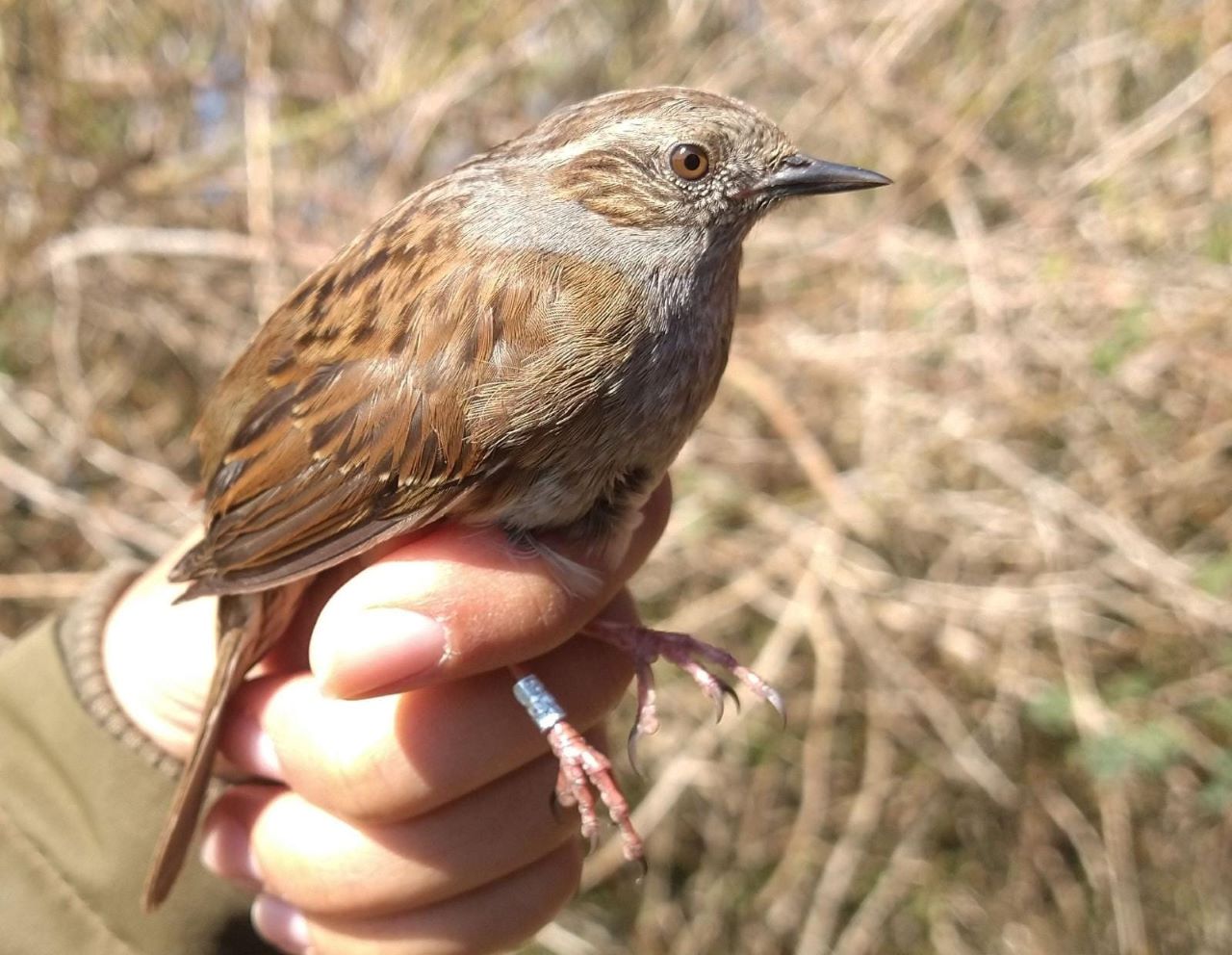
Dunnock "Jernspurv". Foto: Hanelie Sidhu
Ringing totals
Gærdesmutte 4/1
Jernspurv 8/0
Rødhals 2/4
Solsort 0/1
Gransanger 4/1
Fuglekonge 2/3
Rødtoppet Fuglekonge 0/5
Blåmejse 0/1
Bogfinke 2/0
Total: 22/16
People: Hanelie Sidhu, Henrik Jørgensen and our Guests John and Kim
Goldhawk
This morning after Henrik and I opened the nets, we said goodby to Ole, who left to Berlin, but will probably be back in summer again.
After the first Linnet “Tornirisk” for the season, we caught a second one today and had another new species for the season: A Sparrowhawk “Spurvehøg”. It was a beautiful female.
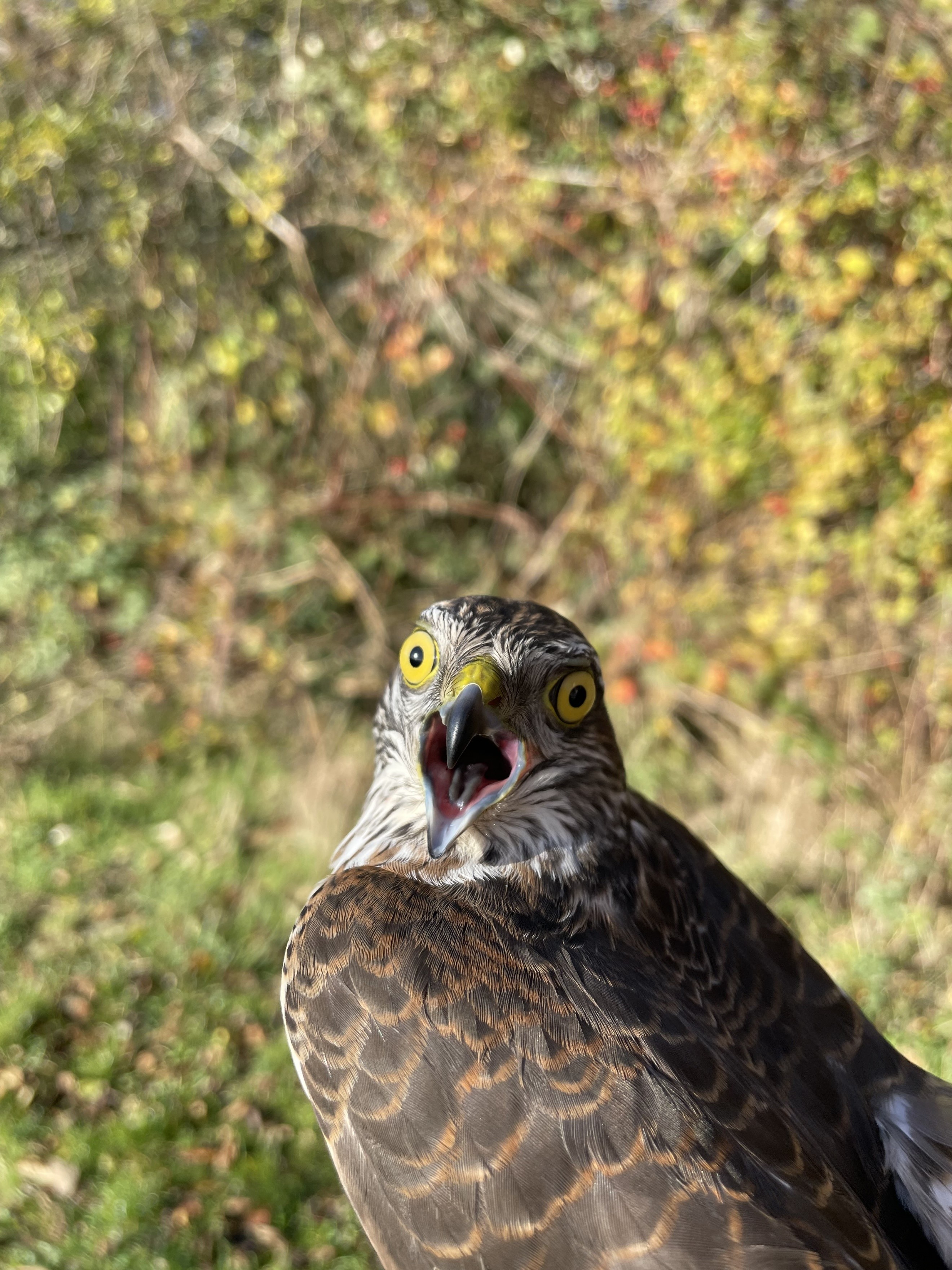
Sparrowhawk "Spurvehøg". Foto Henrik Jørgensen
And there was another reason for me to be happy this morning: We caught a Goldfinch “Stillits”, the first in hand for me!
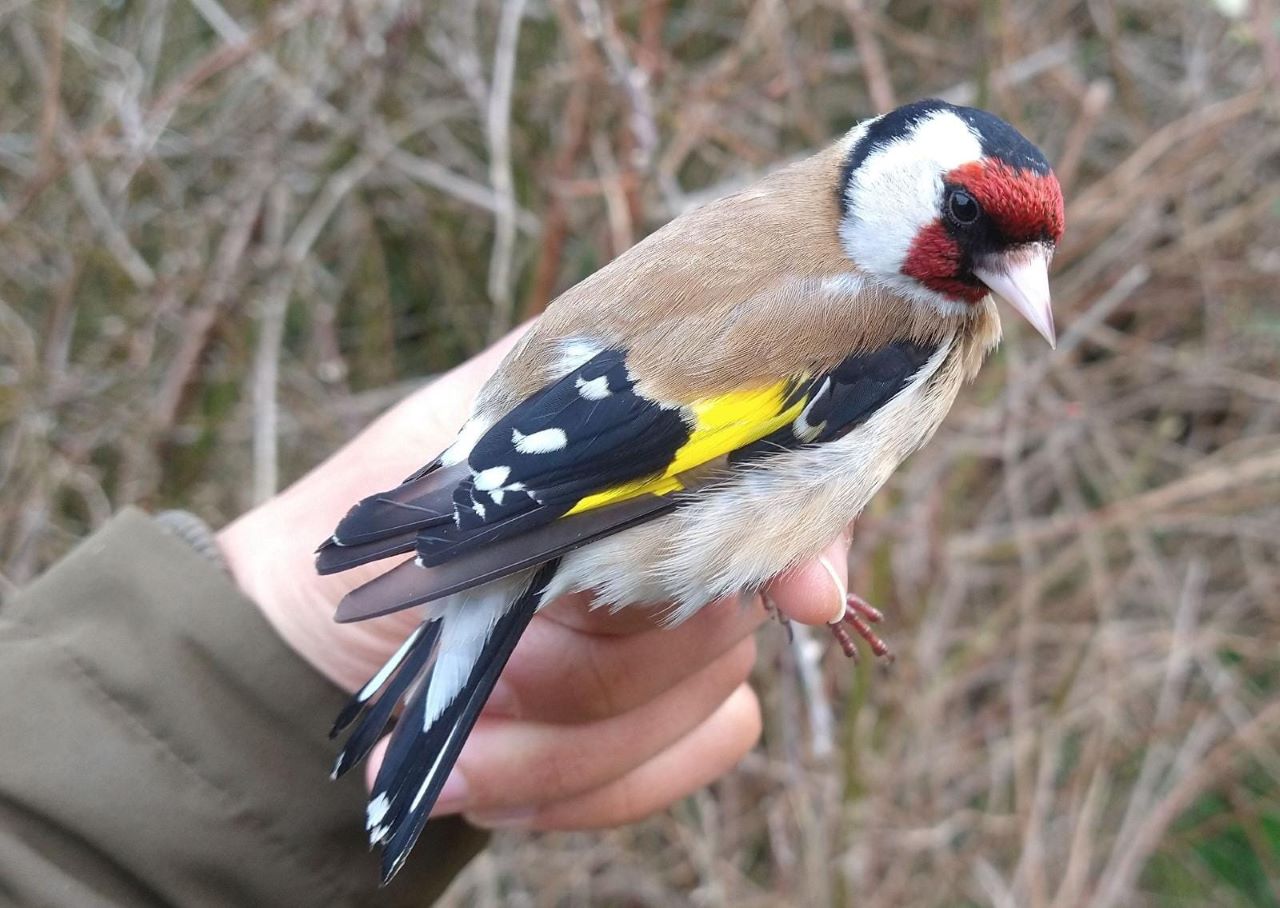
Goldfinch "Stillits". Foto: Hanelie Sidhu
We also got two new Firecrests “Rødtoppet Fuglekonge” and recaptured our old friends Goldcrest “Fuglekonge” male, Ringnumber… 206 and Firecrest “Rødtoppet Fuglekonge”, male 230 again, which I both ringed at the 19th of March, but they seem to like Gedser very much, or maybe they love us? I told 206 today to eat a lot and then go north to Skagen, but I am not sure, if he understood. Probably, I will see him again tomorrow…
Hans and some colleges from the school, where he was teaching, visited later this morning, right in time for the Sparrowhawk “Spurvehøg” and also Anne-Marie and her daughter and Mads came by.
After we closed the nets, our guest John arrived.
Ringing totals
Spurvehæg 1/0
Gærdesmutte 1/2
Jernspurv 8/1
Rødhals 3/5
Solsort 1/4
Gransanger 7/0
Fuglekonge 3/1
Rødtoppet Fuglekonge 3/1
Blåmejse 1/0
Bogfinke 2/0
Stillits 1/0
Tornirisk 1/0
Total 31/16
We are hoping for many birds in the nets tomorrow, the winds look very good!
People: Hans Lind, Mads Elley, Anne-Marie Reith, Hanelie Sidhu, Henrik Jørgensen, Ole Friis Larsen and our Guest John
Ederfugle i tusindvis på forårets største dag
Ringmærkningen:
The Chiffchaffs ”Gransanger” are starting to come! Today we had the best numbers of them for this season, ten newly ringed individuals of this species. And the first Linnet “Tornirisk” of the season was in the high net today. Otherwise, a lot of recaptures.
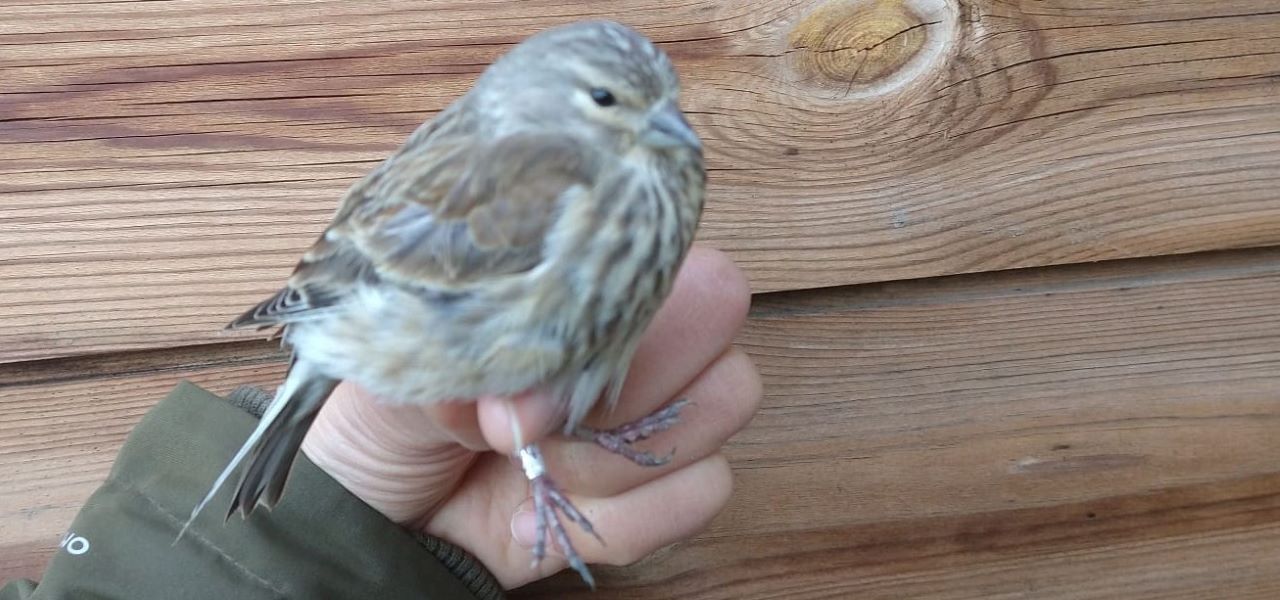
Linnet "Tornirisk", Foto: Hanelie Sidhu
Ringing totals:
Gærdesmutte: 1/3
Jernspurv: 8/0
Rødhals: 5/7
Solsort: 1/2
Gransanger: 10/0
Fuglekonge: 2/2
Rødtoppet Fuglekonge: 0/3
Blåmejse: 0/1
Bogfinke: 3/0
Tornirisk: 1/0
Total: 31/18
Trip to Avnø:
Gert took me on a trip to Avnø today. We were hoping for a Short-eared Owl “Mosehornugle” but had no success with that. It was nice to see the area though. We saw a lot of Spottet Seal “Spættet sæl” and a nice adult White-tailed Eagle “Havørn”. And a bit further, a lot of Avocets “Klyde” for me! We also saw Lapwings “Vibe” Redshanks “Rødben”, Dunlins “Almindelig Ryle”, Oystercatchers “Strandskade”, Pintails “Spidsand”, Gadwall “Knarand”, Curlews “Storspove” and Wigeons “Pibeand”.
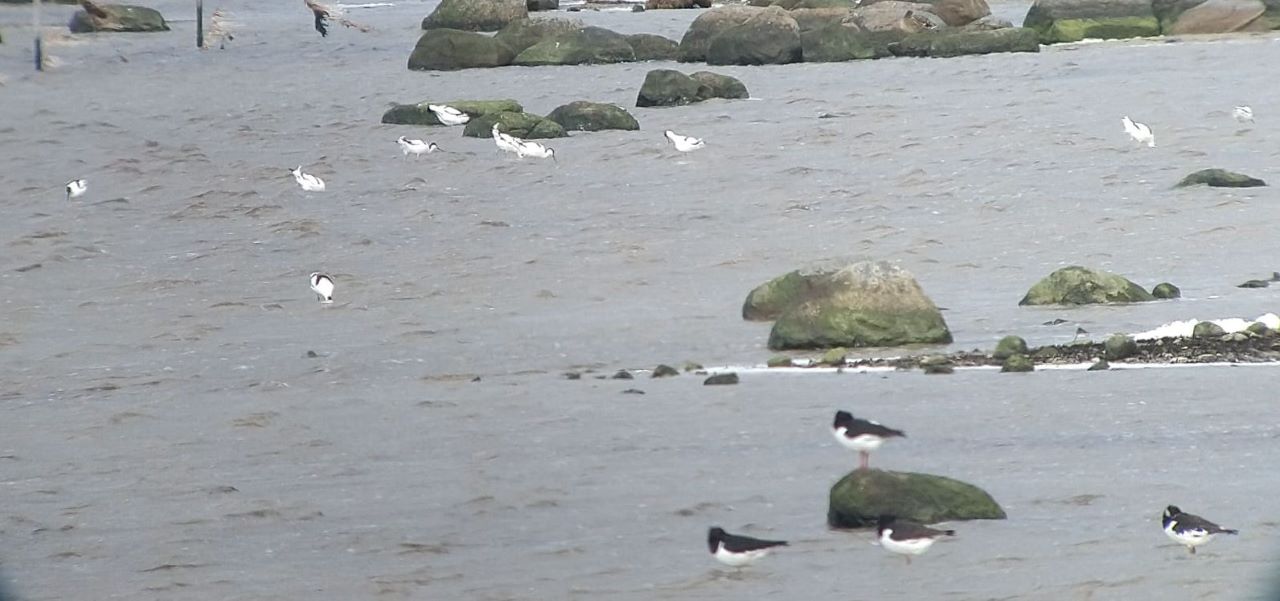
Avocet "Klyde"
Trækket på Odden: Tirsdag blev dette forårs hidtil største ederfugledag med næsten 21.000 i løbet af standardtidens fem timer, op mod tre gange så mange som på den nu næststørste dag, 26. marts med 7.300 Ederfugle (Somateria mollissima). Morgenen var kold og klar med vind fra nordvest, og der var allerede i mørket tegn på, at det kunne blive en af de store dage for trækket af Ederfugle med mange flokke som sorte silhuetter på den tusmørkeblå himmel tre kvarter før solopgang. Indtil da havde vi ikke set træk af Ederfugle før en halv time efter solopgang.
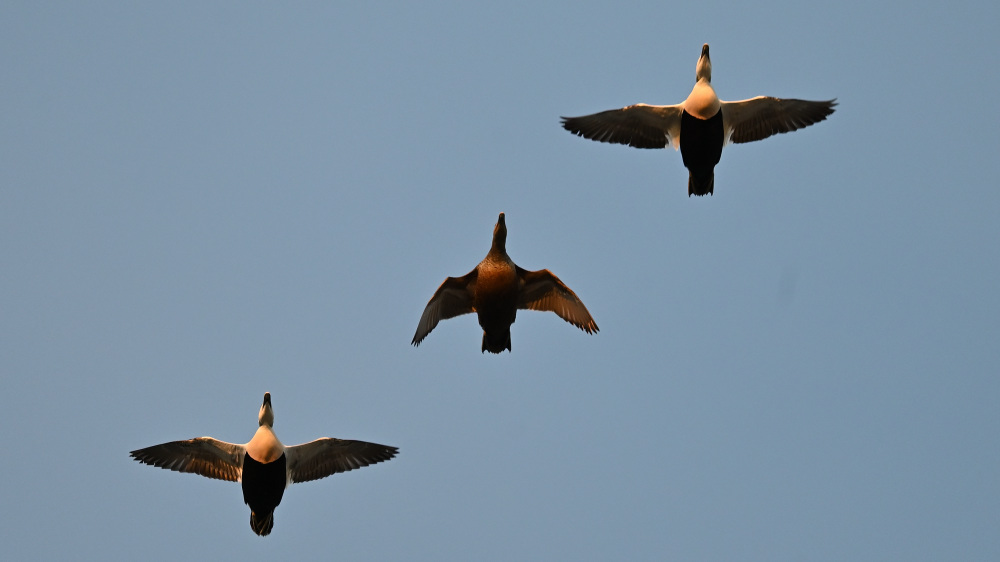
Antallet kunne være blevet større, hvis vi var blevet ude på Odden hele dagen, men vi tæller i fem timer for at få en trend, der kan sammenlignes fra år til år. Louis Hansen blev ude på Odden til omkring klokken 13 og meldte da om tæt på 24.000 Ederfugle, siden starten på standardtiden klokken 6.07, og fra fuglestationen kunne vi se, at der stadig var et pænt træk resten af eftermiddagen. Til gengæld er trækket af Ederfugle tilsyneladende stadig ikke nået de 800 kilometer længere mod øst til vores kolleger ved Põõsaspea neem i Estland, hvor de tirsdag kun så 21 Ederfugle passere mod nordøst, og på samme måde var det ved Santahamina i Finland, hvor der blev set 18 Ederfugle på østligt træk. Fra Dovns Klint på Langeland er der for tirsdag noteret 12.500 Ederfugle mellem klokken 6.10 og 11, altså i samme tidsrum som standardtiden ved Gedser Odde, så ikke alle vores fugle har rejst så langt væk fra.
Andelen af hunner i trækket var tirsdag større end tidligere med 29,4 procent, lidt under hver tredje af dagens Ederfugle.
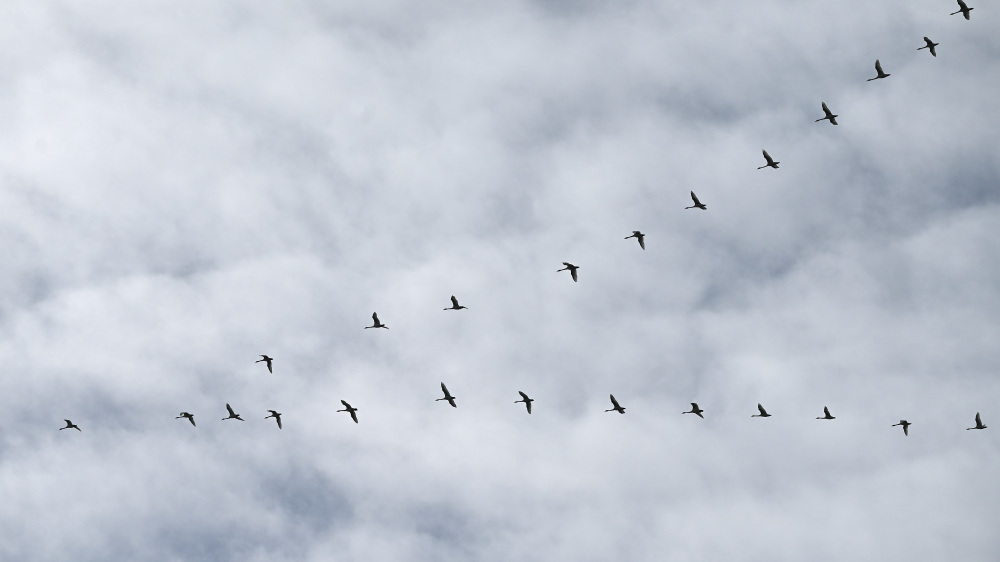
Dette er sidste beretning fra Gedser Odde i marts-april. Onsdag morgen går turen mod syd til halvanden måneds frivilligt arbejde med beskyttelse af rovfugle på Sicilien, blandt andet af trækket over Messinastrædet. Det har som altid været et privilegium at arbejde sammen med dygtige kolleger på Gedser Fuglestation og erfarne lokale folk ude på Odden. Tusind tak til alle.
Se alle dagens observationer ved Gedser Odde i DOFbasen her.
Nyt fra stationen: Gedser Fuglestation er mere end ringmærkning og træktælling. I et projekt med støtte fra Guldborgsund Kommune sætter folk fra stationen i dette forår omkring 100 fuglekasser op til mejser, Stære (Sturnus vulgaris), Rødstjerter (Phoenicurus phoenicurus), fluesnappere og andre arter, der har brug for huller at yngle i. Kasserne bliver sat op rundt omkring i Gedser by og nærmeste omegn. Blandt andet blev der tirsdag sat nogle kasser op i fuglestationens have, hvor de kan indgå i studier af fuglenes ynglesucces.
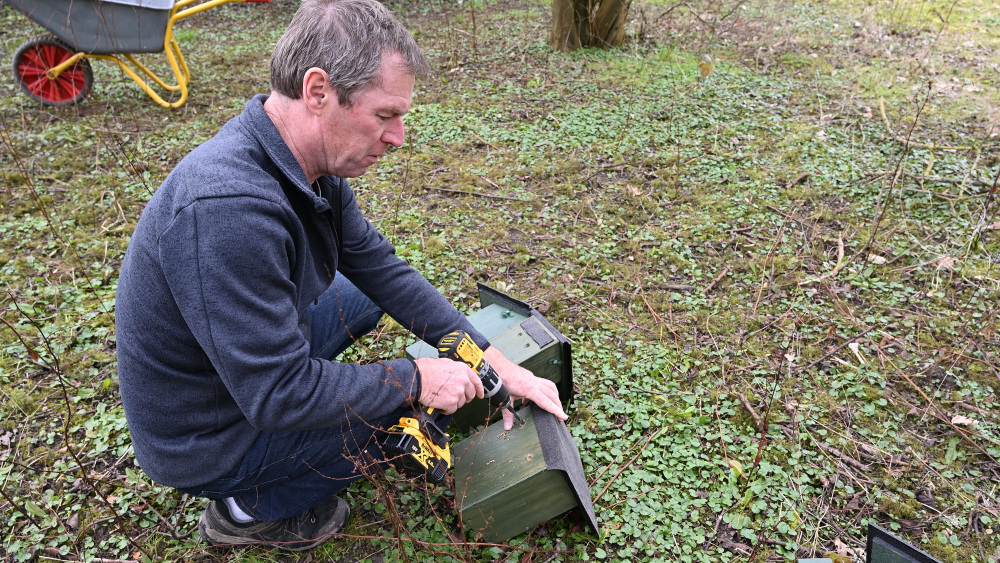
Folk på stationen: Hanelie Sidhu, Henrik Jørgensen, Ole Friis Larsen, Gert Jeppesen.
